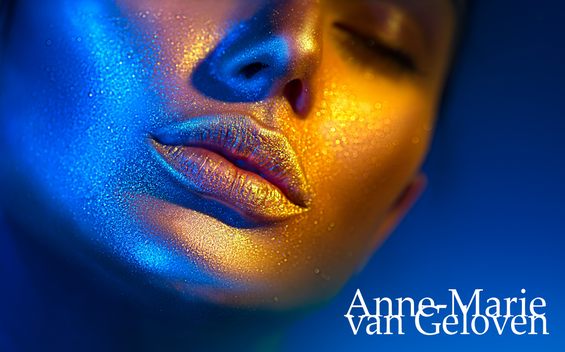
Blue light, is also known as high-energy visible (HEV) light and is the most energetic part of the visible light spectrum (380 - 700 nm) with wavelengths ranging from indigo or ultramarine light 420-440 nanometers, blue light 450-495 nanometers to cyan light 480 - 520 nanometers. Blue light has lower energy than ultraviolet (UV) radiation (280–400 nm) and can reach further into the dermis, up to the depth of 1 mm. [1] Sunlight is the primary natural source of blue light. Up to 50% of the damaging oxidative stress in human skin is generated in the VIS spectrum and the other 50% by UV light [2], contributing to premature ageing, ox-inflammageing and hyperpigmentation like age spots.
Blue light from electronic devices The use of electronic devices has led to increased exposure to artificial blue light sources, however the amount of blue light emitted during the conventional use of electronic devices is by far not enough to trigger harmful skin effects. If you sit in front of a monitor uninterrupted for a week at a distance from the screen of approximately 30 cm, this would be the same as the blue light intensity of spending one minute outside on a sunny day in Hamburg Germany at around midday at midsummer. If you hold a smartphone right next to the skin, the intensity does increase, but it would still take approximately 10 hours of uninterrupted use to match the effect on the skin of just one minute of sunlight. The emissions from electronic devices are barely noticeable in comparison to natural blue light directly from the sun and are, thus negligible. However, blue light or HEV light from sunlight can be harmful for skin. Dr Ludger Kolbe Chief Scientist for Photobiology and his team at Beiersdorf AG did pioneering research regarding the harmful effects of HEVIS. [3-4] I would also like to take the opportunity to debunk an important myth at the start of this article as infrared or near infrared light does not induce damaging free radicals (even in high amounts), there is no such thing "infra-ageing" as a result or IR and in fact red light photobiomodulation supports skin rejuvenation. Read more Direct effects of blue light and HEV Light on skin Blue light and HEV light can have both beneficial and detrimental effects on the skin. The most significant direct effects are mediated through their interaction with chromophores, such as flavins, porphyrins, and opsins, which can trigger the overproduction of reactive oxygen species (ROS), reactive nitrogen species (RNS). and hyperpigmentation. Reactive oxygen and nitrogen species cause DNA damage and modulate the immune response. [1] This oxidative stress can lead to: Photo-ageing: Exposure to blue light and HEV light can induce premature skin aging, causing wrinkles, fine lines, and loss of elasticity. Hyperpigmentation: Blue light and HEV light can stimulate melanin production, leading to uneven skin tone and the development of age spots or other forms of hyperpigmentation. DNA Damage: The ROS and RNS generated by blue light and HEV light can cause DNA damage, plus potentially increase the risk of skin cancer. Inflammation: The oxidative stress triggered by blue light and HEV light can cause an inflammatory response in the skin, exacerbating conditions like acne, eczema, and psoriasis. Molecular and physiological mechanisms of direct blue light effects on the skin [1]
Indirect effects of blue light and HEV Light on skin Blue light and HEV light can also have indirect effects on the skin by disrupting the body's circadian rhythms. This occurs via both the central mechanism, which involves stimulation of light-sensing receptors located in the retina, and via the peripheral mechanism, which involves direct interaction with skin cells. By disrupting the normal circadian rhythm, blue light can negatively affect the skin's natural overnight repair and regeneration processes. [1] The circadian rhythm has been shown to affect multiple cellular and physiological processes occurring in the skin:
Molecular mechanisms of indirect effects of blue light on the skin [1]
Ideal daytime & nighttime skin care regimen When considering cosmetic interventions, a strategy of daytime protection plus defense and night-time repair may be optimal. The skin's own repair mechanisms, such as base excision repair and nucleotide excision repair, attempt to mitigate blue light induced DNA damage. [12] Daytime protection plus defense Of course prevention and/or reduction of blue light exposure from sunlight is key. Reduce the time spent on electronic devices, especially before bedtime, can help minimize the disruption of circadian rhythms and the indirect effects of blue light and HEV light on the skin. Against premature ageing and hyperpigmentation an evidence based effective approach could be the daily use of tinted broadband sunscreen preferably containing Licochalcone A (the most effective anti-oxidant reducing damaging free radical activity from both UV and blue light and moreover protects against collagenase MMP-1 expression) strengthening skin's biological defense [4-5-6-7], while iron oxides in colour pigments provide physical protection against blue light (like zinc oxide and titanium dioxide). Against hyperpigmentation there are (tinted) sunscreens which on top contain the most potent human tyrosinase inhibitor found in dermatological skin care called Thiamidol® [8-9] and one of the 3 ingredients in the "new Kligman Trio" (NT) [18] and Glycyrrhetinic Acid which supports skin's DNA repair and skin pigmentation [10] and inhibits hyaluronidase activity (HYAL1). Most regular sun filters used in sunscreen don't offer any protection against blue light, however according to the website of BASF the chemical UV filters Tinosorb® A2B and Tinosorb® M can reduce the exposure to blue light. [11] Scattering and absorption of blue light [5] The penetration depth of visible light is influenced by the reflection, scattering, and absorption mediated not only by the skin’s physical barrier but also by the VL chromophores in the skin and Fitzpatrick skin or photo-type (FST). The primary VL-scatter and absorption molecules in the skin include hemoglobin, melanin, bilirubin, carotene, lipids, and other structures, including cell nuclei and filamentous proteins like keratin and collagen. Melanin and keratins are the primary VL absorbers and scatterers in the epidermis, while hemoglobin is the dominant absorber, and collagen is the major VL scatter in the dermis. Melanin's absorption spectrum ranges from 200 to 900 nm, with the peak absorption varying based on melanin moiety.. This means that individuals with darker skin types, which have higher melanin content, are more prone to hyperpigmentation from blue light or VIS due to the greater absorption and scattering of VIS in their skin on top of the previously mentioned higher levels of tyrosinase–DCT complexes leading to increased melanogenesis, leading to both transient and long-lasting pigmentation [13], dependent upon the total dose and exacerbation of melasma especially in individuals with FSTs III to VI. Blue light tanning Recent data demonstrate synergistic effects between VL and UV-A on erythema and pigmentation. VL-induced pigmentation is more potent and more sustained than UVA1-induced pigmentation in darker skin tones.Typically, three mechanisms are involved in the responsive reaction of melanocytes to VL, with increased melanin content: immediate pigment darkening (IPD), persistent pigment darkening (PPD), and delayed tanning (DT). [15] Read more. VL can also exacerbate post inflammatory hyperpigmentation (study with FST IV and V). [16] Blue light therapy While the detrimental effects of blue light and HEV light on the skin have been well-documented, these wavelengths have also shown promise in the treatment of certain skin conditions. In controlled clinical settings, blue light has been used to: Treat Acne: Blue light can reduce the growth of Propionibacterium acnes, the bacteria responsible for acne, and has an anti-inflammatory effect. Manage Psoriasis and Atopic Dermatitis: Blue light has been found to have an anti-inflammatory and antiproliferative effect, making it potentially beneficial for the treatment of these chronic inflammatory skin diseases. Reduce Itch: Some studies have suggested that blue light may help alleviate the severity of itching in certain skin conditions. The optimal protocols for blue light therapy are still being developed, and the long-term safety of this treatment modality requires further investigation and should not be initiated without HCP recommendation and monitoring. Vitiligo: Blue light therapy via LEDs can stimulate repigmentation in patients with vitiligo with minimal adverse events, however larger studies are needed. [17] Overall, the research suggests that prolonged or excessive exposure to high-energy blue light, can have negative long-term effects on skin structure, function, and appearance in all phototypes. As our understanding of the individual variations in skin's response to blue light exposure deepens, the development of personalised or tailored effective solutions become increasingly more tangible. Always consult a qualified healthcare professional or dermatologist to determine what the most suitable approach is for your particular skin condition and rejuvenation goals. Take care! Anne-Marie References
Comments

Many people associate a tan with health, beauty and an active lifestyle. Although a moderate dose of solar radiation is indispensable for our health, unfortunately, there is no such thing as a real "healthy tan" or "healthy sun-kissed glow" as it is always a visible sign of skin damage. Tanning is a response by the skin to exposure to ultraviolet (UV) radiation (and HEV or Blue Light), either from natural sunlight or artificial sources like tanning beds which leads to photo-ageing, pigmentary disorders (like age spots or hyperpigmentation) and immunosuppression, hence skin cancer. When skin is exposed to sunlight: UV rays and high energy visible light (HEV) or also called Blue Light (the most energetic region of HEV), it produces more melanin, a pigment that darkens the skin as a (partial) protective mechanism to prevent further damage. The amount of artificial blue light emitted during the conventional use of electronic devices is not enough to trigger harmful skin effects. (Click here to read more)
MELANIN Melanin is only produced by cells called melanocytes, mostly distributed in the epidermal-dermal junction. Melanocytes contain specialized organelles called melanosomes to store and produce melanin. Melanosomes are transferred from the melanocytes to the neighboring keratinocytes, which are the most abundant cells in the epidermis. One melanin-forming melanocyte surrounded by 36 keratinocytes and a Langerhans cell is called the melano-epidermal unit. [1.2] Melanocytes use the amino acid tyrosine to produce melanin and protect epidermal keratinocytes and dermal fibroblasts from the damaging effects of solar radiation.. [13] The are two melanin pigment classes:
Differences in skin pigmentation do not result from differences in the number of melanocytes in the skin, as one might assume, but from differences in the melanogenic activity (melano-competence), the type of melanin produced in melanosomes (the ratio between eumelanin and pheomelanin differs per Fitzpatrick phototype) and the size, number and packaging of melanosomes, with melanin content of melanosomes ranging from 17.9% to 72.3%. [7] The amount of melanin is never enough for adequate photoprotection, and a "base tan" does not prevent sunburn. Particularly darker phototypes are more sensitive for the damaging effects of Blue Light. Both eumelanin and pheomelanin production are promoted by UV radiation and Blue Light and therefore sunscreens offering a combination of both UV (A + B) protection and Blue Light defense are recommended for all phototypes. TANNING PROCESS The skin's tanning process occurs in four distinct phases: [3]
ROLE OF UVA, UVB AND BLUE LIGHT One of the most important acute effects of UVR is DNA photodamage. UVA and UVB show different properties regarding their biological effects on the skin. [7] Shorter wavelengths (nm) correspond to higher energy. Infrared does not induce oxidative stress. Read more UVA radiation (320-400 nm) penetrates deeper into the skin and can induce indirect DNA damage by the generation of reactive oxygen species (ROS), leading to premature skin aging. UVA, in contrast to UVB is not filtered by window glass, is able to penetrate deeper into the skin and reach the dermis. They are present constantly, with relatively equal intensity, during all daylight hours throughout the year. It has been estimated that 50% of exposure to UVA occurs in the shade. UVA rays are less intense than UVB, but there are 30 to 50 times more of them. To produce the same erythemal response, approximately 1000 times more UVA dose is needed compared with UVB. [7] The bulbs used in tanning beds emit mostly UVA. UVB radiation (280-320 nm) is less prevalent than UVA, primarily affects the outermost layers of the skin, causing direct DNA damage (more potent than UVA) and triggers inflammatory responses that lead to increased melanin production. UVB radiation fluctuates throughout the day, are at their strongest at noon. and are more cytotoxic and mutagenic than UVA. The action spectrum for UV-induced tanning and erythema are almost identical, but UVA is more efficient in inducing tanning whereas UVB is more efficient in inducing erythema (redness). Dark skin is twice as effective compared to light skin in inhibiting UVB radiation penetration. [7] UVB helps the skin to produce Vitamin D. Blue light (400-500 nm) visible light accounts for 50% of sunlight [11] and can contribute to immediate, delayed, continuous and long-lasting pigmentation by activating melanocyte-specific photoreceptors and increasing melanin synthesis, particularly in individuals with darker (melano-competent) skin types [9], cause DNA damage [10] and generate damaging reactive oxygen species in both the epidermis and the dermis. [12] The effects may last longer than those induced by UVA and UVB radiation. Blue Light can penetrate even deeper than UVA and reach the hypodermis. Blue light therapy is used to target acne causing bacteria and inflammation, however the risks might outweigh the benefits especially in darker phototypes and it might worsen acne marks. EPIDERMIS AND DERMIS Both dermal fibroblasts and epidermal keratinocytes play a crucial role in regulating skin pigmentation and tanning response. [13 15] In comparison to epidermal tanning, dermal tanning is less visible, however more immediate. Dermal fibroblasts secrete various paracrine factors that regulate melanocyte function, survival, and melanin production. Factors like hepatocyte growth factor (HGF), nerve growth factor (NGF), stem cell factor (SCF), and basic fibroblast growth factor (bFGF) stimulate melanogenesis and pigmentation [14 15] Fibroblast senescence and altered secretory profiles in conditions like melasma contribute to abnormal pigmentation by stimulating melanogenesis. [15] Epidermal keratinocytes produce factors like α-melanocyte stimulating hormone (α-MSH) and Wnt1 that activate melanogenic pathways in melanocytes, leading to increased melanin synthesis and transfer to keratinocytes. [15 16]. Keratinocyte-derived exosomes can enhance melanin production by melanocytes. [16] Differences in autophagic activity between various keratinocytes also influences pigmentation. [15] Enjoy the sun, however protect your (and your children's) skin from a photo-damaging tan to remain skin health and beauty. Sunless self-tanning products containing dihydroxyacetone (DHA) or Erythrulose provide a safe alternative to achieve a "sun-kissed" glow. You can use after-sun skin care which helps to rehydrate, reduce damage of "sun-stressed" skin and support it's repair. Always consult a qualified healthcare professional or dermatologist to determine what the most suitable approach is for your particular skin condition and rejuvenation goals. Take care! Anne-Marie References

In skin biology, senescence is a process by which a cell ages and permanently stops dividing but does not die. This is why they are also referred to as "zombie cells". Age-related accumulation of senescent cells is caused by of increased levels of senescence-inducing stressors and/or reduced elimination of senescent cells. Under normal physiological conditions, senescent cells play an important role maintaining cellular homeostasis and inhibiting proliferation of abnormal cells. However, over time, large numbers of zombie cells can build up in the skin and contribute to the overall reduction in skin's regenerative properties, impacting both its beauty and health.
There are 2 forms of cell senescence: Acute senescence: Senescent cells are produced in response to acute stressors to facilitate for example tissue repair, wound healing. They are cleared by our immune system. Chronic senescence: A not programmed process as response to prolonged stress or damage and these senescent cells are not cleared by our immune system, leading to the accumulation of zombie cells impacting our skin health and beauty. It has been suggested that inflammageing is mainly related to senescent cells and their associated SASP (Senescence-Associated Secretory Phenotype) which increase in the body with age and contribute to inflammageing. Senescent cells cause inflammageing and inflammageing causes cell senescence. [1] Senescence can be triggered by a number of stress signals to the cell [1]:
Mechanisms of skin cell senescence:
The presence of senescent cells accelerates the ageing process due to their communication with nearby cells through various molecules: [18]
Fibroblast senescence could be the main driver of the skin ageing. [3] The increased number of senescent fibroblasts results in the production of SASPs rich in pro-inflammatory cytokines, including interleukin (IL)-1, IL-6, IL-8, IL-18, matrix metalloproteinases (MMPs), and a variety of other inflammatory chemokines [2] resulting in the breakdown of collagen, loss of elasticity and wrinkle formation. [3] Autophagy in dermal fibroblasts is essential for maintaining skin balance and managing the ageing process, particularly in response to external stressors like UV radiation and particulate matter (PM), by repairing cellular machineries. [4] Insufficient autophagy leads to an exaggerated skin inflammation triggered by inflammasome activation, resulting in accelerated ageing characteristics. When exposed to UVB (in vitro), skin cell types like fibroblasts and keratinocytes show DNA damage and increased senescence markers, such as increased SASPs. [3] Dermal fibroblasts also release insulin-like growth factor (IGF)-1, essential for epidermal cell proliferation and differentiation. [5] IGF-1 signalling in senescent fibroblasts is significantly decreased [6]. Inhibition of the IGF-1 pathway decreases collagen production in the dermis, causing epidermal thinning. Additionally, mitochondrial dysfunction and increased levels of superoxide anions prompt fibroblast ageing, thereby speeding up the skin ageing process. [5] Fibroblasts isolated from photo-aged skin produce a greater amount of pro-melanogenic growth factors. [14] Ageing-associated pigmentation has also been reported to be driven by (UVA-induced) fibroblast senescence. [15-16] Keratinocyte senescence The epidermis shows less impact of senescent keratinocytes due to their quicker turnover in comparison to fibroblasts. Senescent keratinocytes experience reduced ECM production and cell adhesions [8], along with elevated MMP expression in UV-induced senescence [9], and increased SASP levels, including pro-inflammatory cytokines. [10] Airborn particulate matter (PM2.5) can penetrate a disrupted skin barrier. PM2.5-induced ROS leads to epigenetic modification: reduced DNA methyltransferase, elevated DNA demethylase expression, p16INK4a promotor hypomethylation and therewith accelerated keratinocyte senescence. [11] Keratinocytes are the main type of cells that signal the need for melanogenesis. [12] UVR-induced DNA damage in keratinocytes activates melanogenesis. [13] Melanocyte senescence Senescent melanocytes express markers of inflammageing and dysfunctional telomeres. Senescent melanocyte SASPs induce telomere dysfunction and limit the proliferation of the surrounding cells, hence, senescent melanocytes affect and impair basal keratinocyte proliferation and contribute to epidermal atrophy. [17] STRATEGIES TO COMBAT CELL SENESCENCE PREVENTION Sunscreen: Protection against UV radiation combined with blue light defense (Licochalcone A: powerful anti-oxidant, Nrf2-Activator & increasing Glutathione + Colour pigments) and prevention + repair DNA damage (Glycyrrhetinic Acid) INTERVENTION Senotherapeutics can be classified into three development strategies: [25]
Skin care ingredients: [18]
Of course a healthy life-style and diet (consider also intermittent fasting) will support both your body & skin longevity and beauty Prevention and intervention of skin cell senescence offers a promising approach to improve skin health and beauty. Always consult a qualified healthcare professional or dermatologist to determine the most suitable approach for your particular skin condition and rejuvenation goals. Take care! Anne-Marie References

Many of the skin regenerating or rejuvenating treatments, like energy based devices in the doctors-office are based on the principle to cause controlled damage and therewith provocation of a skin rejuvenating repair response. One of the fascinating mechanisms behind laser "damage" is the heat shock response leading to increased production of regenerating heat shock proteins (HSPs). Heat shock proteins respond to heat stress, are crucial cellular defense mechanisms against stress (environmental and physiological), act as chaperones, aiding in protein folding, prevention of protein damage, cellular protection and repair. [1]
HEAT SHOCK PROTEINS AND OX-INFLAMMAGEING UV radiation and blue light cause oxidative stress and inflammation, and can overwhelm skin's own capacity to counteract the increased formation of reactive oxygen species (ROS) and inflammatory mediators. Chronic oxidative stress state and chronic low grade of inflammation are hallmarks of skin ageing and their combination can be called ox-inflammageing. Oxidative stress and inflammation alter cellular signal transduction pathways and thereby the expression of the ECM genes as well as the structure of the ECM proteins like collagen, fibronectin and elastin. Their reduced expression and increased degradation manifests eventually at the skin surface as wrinkles, loss of firmness, and elasticity. Heat shock proteins are chaperone proteins that facilitate the formation of the ECM and prevention of molecular oxidative damage or degradation and are classified based on their molecular weights.
STIMULATION OF REJUVENATING HEAT SHOCK PROTEINS Heat shock protein synthesis can be initiated not only by heat but also by many chemical and physical stimuli, such as heavy metals, amino acid analogues, oxidative stress, viral infection and UV and ionizing irradiation. [10] Laser Laser treatments have been shown to induce a heat shock response in the skin from epithelial cells to deeper connective tissues, leading to the production of heat shock proteins. This response is characterized by the temporary changes in cellular metabolism, release of growth factors, and increased cell proliferation and thus contribute to tissue regeneration and rejuvenation. [11] CBD It has been proven that a large number of genes belonging to the heat shock protein super-family were up-regulated following cannabidiol (CBD) treatment. [12] UV radiation Ultraviolet radiation (UV)‐induced cell death and sunburn cell formation can be inhibited by previous heat shock exposure and UV itself can induce HSP expression. However, levels of HSP-27 have been found to be elevated in sun‐protected aged skin indicating a link between HSP-27 expression and age‐dependent epidermal alterations. [13] I would recommend daily protection from UV radiation and blue light (or high energy visible light). Ultrasound Ultrasound exposure at different frequencies, intensities, and exposure times can induce HSP-72 expression. Higher ultrasound frequencies, such as 10 MHz, have been found to significantly increase HSP-72 levels. Additionally, increasing the temperature during ultrasound exposure has shown to enhance HSP-72 expression. Interestingly, ultrasound at 1 MHz was unable to induce HSP-72 significantly, while 10 MHz ultrasound induced HSP-72 after 5 minutes of exposure. [10] Radiofrequency Radiofrequency has been shown to increase HSP-70 and decrease melanin synthesis and tyrosinase activity. [14] RF-US treatment significantly increased levels of HSP47 proteins. [15] Red & near infra red light Although I've not seen much peer reviewed published evidence, red light and near infra red light therapy may release the HSPs in the skin if tissue reaches >42 - 45 degrees (even for 8 - 10 seconds). Nicotinamide Nicotinamide and its derivatives have been found to stimulate the expression of heat shock proteins, including HSP-27, HSP-47, HSP-70, and HSP-90 in the skin. These proteins play as mentioned before an essential role in collagen production, skin protection, skin health and rejuvenation. [6] NAD as nutrient interestingly has proven to tweak the epigenome by modulating DNMT1 enzymatic DNA methylation and cell differentiation. [16] In topical applications an ingredient called Dihydromyricetin also called Epicelline® has been successful in inhibiting DNMT1 enzyme activity biochemical assays. [17] Stimulation of heat shock proteins offers a promising and novel invasive, non invasive and topical approach for skin regeneration, rejuvenation and reduction of ox-inflammageing. Always consult a qualified healthcare professional or dermatologist to determine the most suitable approach for your particular skin condition and rejuvenation goals. Take care! Anne-Marie References

Like epigenetics and exosomes, neurocosmetics represent a revolutionary approach for skin care incorporating neuroscience principles, leveraging the skin-brain connection to improve skin health and beauty. The term itself is a fusion of the words neuroscience and cosmetics. It differs from psychodermatology which like neurocosmetics connects the interaction between mind and skin, but in a different way. Some describe it as how simple sensory stimulation can improve our overall wellbeing and call it "mood beauty", however this doesn't do it justice as neurocosmetics go beyond mood boosting skincare.
DEFINITION NEUROCOSMETICS Dermatologist Professor Laurent Misery back in 2002 described that neurocosmetics are products which are supposed to modulate the neuro-immuno-cutaneous-system (NICS) function at an epidermal level. Skin cells can produce neuromediators, which are mediators for transmission of information between skin, immune and the nervous system. All skin cells express specific receptors for neuromediators and by binding of the neuromediator to its receptor, modulation of cell properties and skin functions are induced like cell differentiation and proliferation (renewal), pigmentation, etc. Hence, keratinocytes, Langerhans cells, melanocytes, endothelial cells, fibroblasts and the other cells of the skin are modulated and controlled by the nerves and in return skin is able to modulate neuronal activity and growth. [1] SKIN-BRAIN CONNECTION In an article from the International Journal of Novel Research and Developments, the skin-brain connection was described as a psychobiological concept that highlights how emotions, stress, and neurotransmitters impact skin health. Indicating that the skin acts as a neuroimmunoendocrine organ, emphasizing its sensitivity to neural signals and stress responses. [4] CUTANEOUS NERVOUS SYSTEM The skin a sophisticated sensory organ that allows you to interact with your environment through touch and feel. It contains a complex network of nerves that send information about sensations like pressure, pain, itch and temperature from the skin through the spinal cord to the brain [9]. The dynamic interactions between the skin and the nervous system is influenced by factors like stress and inflammation, which can impact skin health and ageing. [7] Nerves in the skin: These nerves are like tiny messengers that tell your brain about what your skin is feeling: pressure, heat or pain. Types of nerve fibers: Some are thick and wrapped in a protective coating, which helps them send messages quickly. Others are thin and slow but are very good at sending messages about pain or temperature changes. [3] Sensory receptors: These receptors can tell if something is touching the skin lightly or if there's a lot of pressure. They can also sense if something is hot, cold, or causing pain. [3] Autonomic nervous system: Part of the cutaneous nervous system helps control things that happen in the skin automatically, like sweating to regulate body temperature. [8] Nerve cells: There are about 20 different types of neurons in our skin. [10] The contribution of epidermal keratinocytes to NICS [3]
CUTANEOUS NEURO-AGEING Neuro-ageing is defined as the changes in the nervous system which cause continuous neurodegeneration due to oxidative stress, neuroinflammation or impaired neuromodulation. As skin ages, Aβ-toxin (increased by oxidative stress) accumulates at the nerve endings innervating the tissue, causing disrupted cellular communication, particularly affecting fibroblasts’ ability to produce collagen and extracellular matrix. On top there is a decrease of nerve growth factor (NGF) production, important for the development and maintenance of nerve cells. Different factors can lead to a drop in NGF production, resulting in malfunctioning keratinocytes and reduced lipolytic activity of adipocytes, visibly impacting skin hydration and firmness. [6] Skin nerve fibres are significantly reduced in number following UV irradiation and in ageing skin [5] and therefore neuro-protectors or targetting neurodegeneration can reduce stress manifestations and promote healthy cellular communication for optimal skin function. [3] Although not much is known regarding skin specific or topical neuroprotectors (most research was focussed on the brain), probably potent anti-oxidants, by significantly reducing oxidative stress from UV and blue light and anti-inflammatory ingredients may inhibit skin neuro-ageing and can be neuroprotective especially when combined with sunscreen and strengthening of the skin barrier. NEUROCOSMETIC VARIETY OF ACTIONS
THE FUTURE OF NEUROCOSMETICS The neurocosmetics market is booming, with a projected value of USD 2.69 billion by 2030. [11] The future of neurocosmetics holds promise for innovative ingredients and concepts that harness new neuroscientific insights to revolutionize skin care and sunscreen formulations, to cater to both physical and emotional aspects of skin health and beauty. Take care! Anne-Marie References

One of the people I follow ever since I started to work on skin epigenetics back in 2017 and longevity is Harvard professor David Sinclair. He is best known for his work on understanding why we age and how to slow its effects. He was talking about hormesis, a phenomenon where exposure to low doses of stressors induces beneficial effects. A hormetic (cellular defense) response can modulate ageing processes by activating genes related to maintenance and repair pathways through mild stress exposure in our body and skin, leading to enhanced longevity (thus anti-ageing) and health. [1 - 2]
Originating from the early 2000s, the concept of hormesis has evolved to evidenced based dermatological applications. [3] Various factors, including environmental stressors, lifestyle choices, and genetic predispositions, can influence the hormetic responses in skin cells. Understanding these influences is essential for optimizing skin health and beauty through hormetic pathways. Many terms are used for hormetic responses in the scientific literature, including the Arndt-Schulz Law, biphasic dose response, U-shaped dose response, preconditioning/adaptive response, overcompensation responses, rebound effect, repeat bout effect, steeling effect, among others. [4] Ageing is an emergent, epigenetic and a meta-phenomenon, not controlled by a single mechanism. Cellular damage has three primary sources: [3]
Effective homeodynamic space or buffering capacity (body's ability to maintain stability or balance in changing conditions) is characterized by:
Stress response is a reaction to physical, chemical, or biological factors (stressors) aimed at counteracting, adapting, and surviving, is a critical component of the homeodynamic space. There are seven main cellular stress response pathways:
Hormetins can be categorized into three types:
Being aware of the phenomenon of hormesis can result in discovering the usefulness of new compounds, or synergistic effects of combining hormetic treatments which otherwise may have been rejected due to their effects of stress induction. What is bad for us in excess, can be beneficial in moderation, or (quote): "What doesn't kill you makes you stronger". [6]. The future of hormesis in dermatology holds great promise for innovative interventions, advanced hormetic technologies or personalized skin care regimens. Always consult a qualified healthcare professional or dermatologist to determine the most suitable approach for your particular skin condition and rejuvenation goals. Take care! Anne-Marie Read more: The impact of senescent zombie cells on skin ageing The role of heat shock proteins in skin rejuvenation Neurocosmetics, the skin-brain connection & neuro-ageing The role of the lymphatic system in ageing skin The power of light and photo-biomodulation Bio-stimulators Skin glycation Exosomes References

While factors like genetics and lifestyle (including sun exposure) play significant roles in skin ageing, the role of the lymphatic system in skin ageing is an overlooked however interesting strategy to improve skin's youthful functional (health) and physical attributes (beauty).
The lymphatic system, a vital part of the immune system, is responsible for draining excess fluid, toxins, and waste products from tissues. In the skin, lymphatic vessels collect waste and transport it to lymph nodes for filtration. The lymphatic vessels work with tiny, reflexive muscular contractions constantly pumping cleansing (toxins and debris) lymph fluid through their channels. Interestingly it explains why injections with the muscle relaxant botulinum toxin can cause oedema. The function of the lymphatic system
As we age the lymphatic function and density is decreasing 1:
Effects of lymphatic system decline on skin:
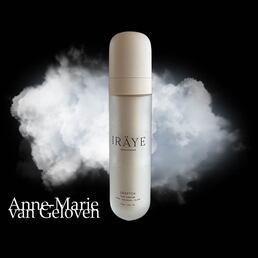
Rejuvenating the lymphatic system for youthful sculpted skin:
Wrongful injected fillers in the tear trough or malar (eye socket - cheek area) septum can lead to worsening of malar oedema (fluid retention) or malar bags. Always consult a qualified healthcare professional or dermatologist to determine the most suitable approach for your particular skin condition and rejuvenation goals. Take care! Anne-Marie References: 1. Structural and Functional Changes in Aged Skin Lymphatic Vessels R. Kataru et al. Front. Aging, 2022 2. Reduction of lymphatic vessels in photodamaged human skin Kentaro Kajiya, Rainer Kunstfeld, Michael Detmar, Jin Ho Chung J Dermatol Sci. 2007 3. Patent Cosmetic preparations comprising natural activators 4. Patent Cosmetic preparations comprising daphne extracts 
If you've scrolled through Instagram, you may have caught a glimpse of dermatologists raving about LED masks emitting red light, the secret, evidenced based weapon behind skin rejuvenation known as photo biomodulation. It uses low-powered light within the red to near-infrared range (wavelengths from 632 to 1064 nm) to induce a biological reaction aka stimulate cellular processes. The wonders of red light, also known as LLLT (low-level laser therapy), PBM (red light photo-biomodulation), or PBMT (photo-biomodulating therapy), extend far beyond non-invasive skin rejuvenation. I am not a fan of devices for home use, mostly because of lacking safety and/or efficacy, PBM definitely earned it's prominent spot in my skincare routine.
A summary of the benefts of red light with and without near infrared light for skin Numerous studies have demonstrated the effectiveness of red and infrared light therapy for skin rejuvenation. A combination of red light and near IR light has proven to stimulate the production of collagen (I & III) plus elastin production (Li WH et al Int J Cosmet Sci 2021), enhance mitochondrial ATP production, cell signaling, growth factor synthesis, rebalance ROS (reactive oxidative species) and reduce inflammation. Stem cells can be activated allowing tissue repair and healing. Wrinkle and scar reduction was observed and it can reduce UV damage both as treatment and prophylactic measure. In pigmentary disorders such as vitiligo, it can increase pigmentation by melanocyte proliferation and reduce depigmentation by inhibiting autoimmunity (Pinar Avci et al. Semin Cutan Med Surg. 2013 & Mitchell J Winkie et al. Review Photodermatol Photoimmunol Photomed A focused review of visible light therapies for vitiligo 2024). It has the potential to activate both keratinocytes (epidermis) and fibroblasts (epidermal junction and dermis). With consistent use, you can expect a reduction of lines and wrinkles, improvement of skin tone and texture. PBMT (when done effective and safe) will compliment both your skin rejuvenating and regenerating at home skincare regimen and in-office procedures or even post-surgical skin recovery. ATP ATP (adenosine triphosphate) is the primary source of energy for cellular processes and plays a crucial role in various biological functions. When red light with specific wavelengths (630 nm to 638 nm and 810 nm) is absorbed by the skin cells, it stimulates the mitochondria, which are the powerhouses of the cells responsible for ATP synthesis. This increase in ATP production is providing cells with more energy to carry out their functions effectively and has several beneficial effects on the skin like boosting cellular metabolism, promoting more efficient nutrient uptake and waste removal. The increased ATP levels facilitate collagen synthesis by fibroblasts, a vital component for skin structure, elasticity and firmness and reduction of lines and wrinkles.. ATP aids in the repair and regeneration of damaged skin cells. It accelerates the healing process, making it beneficial for wound healing, post-surgical recovery, and addressing skin issues such as acne scars. ROS (Reactive Oxidative Species) By modulating ROS levels, red light therapy helps reduce oxidative stress and its detrimental effects on the skin. ROS are highly reactive molecules that are naturally produced by cells as byproducts of metabolic processes. While low levels of ROS play important roles in cellular signaling and immune responses, excessive ROS can lead to oxidative stress and damage to cells and tissues. Restoring the balance of ROS result in improved skin health, reduced inflammation, and enhanced skin rejuvenation. Red light therapy has been shown to modulate reactive oxidative species (ROS) levels in the skin by promoting antioxidant defense mechanisms and reducing oxidative stress:
The difference between LLLT and PBM LLLT refers specifically to the use of lasers, which produce coherent, focussed and an intense beam of monochromatic light, while PBM has a broader range of light sources, may include laser as well as light-emitting diodes (LEDs) and other non-laser devices. LEDs are often used in PBM because they are cost effective, versatile and have the ability to cover large treatment areas. LLT uses higher power densities with more energy and has a shorter treatment duration in comparison to PBM to achieve desired therapeutic effects. While there are similarities in terms of mode of action", there is a difference of light source, treatment application and parameters. Based on consensus, PBM and PBMT are considered the correct way to describe this photonic specialty for therapeutic applications. In this post I will focus on PBM and specifically LEDs. LED masks and LED panels LED masks specifically produced by the brand Omnilux (FDA cleared) are currently very popular for very good reasons; they are safe and effective when the LEDs emit the right wavelengths and used in the recommended frequency. Omnilux combines 2 therapeutically effective and complimentary wavelengths: 633nm and near-infrared 830 nm. Both wavelengths (more precise 630nm + 850nm) I would recommend to minimally look for in any red LED device, which will disqualify most LED masks and panels in the market! I've include some (not affiliated) links to devices below. Both masks and panels can be effective, however most panels are stronger in comparison to masks 60 mW/cm² vs mW/cm²), hence have the benefit of a shorter treatment time to get a similar result. Intensity and power of red light therapy devices are typically measured in terms of irradiance (measured in milliwatts per square centimeter, mW/cm²) and radiant flux (measured in watts, W), which quantify the amount of light energy emitted by the device. Wearing a mask during a hot summer or in a warmer climate will make you sweat and depending on the materials of the mask and straps, they may be very uncomfortable to wear. Panels have the benefit that they give a more even distribution of emitted light as masks are worn on the face and thus the LED bulbs are pushed on a small skin surface area, panels can cover a larger area (depending on their size) and are more versatile in use, as area's like neck, décolletage, or knees are easier to treat with a panel. With a mask you may be more mobile, although I would not recommend walking around while using the mask. My personal preference would be a panel for the reasons mentioned before and panels are more suitable (more hygienic) for family sharing. My son can use it after an intense workout to speed up his recovery and I like to use it for purposes beyond photo-biomodulation or skin rejuvenation, for example to improve my sleep. With a panel I get more "bang for my buck". 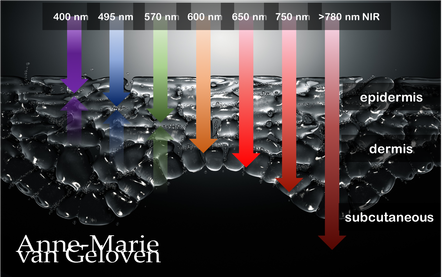
Red light and NIR (Near Infra Red light) have the ability to penetrate varying depths of the skin, resulting in distinct benefits, thus combinations of wavelengths will provide complementary effects.
630 nm Wavelength This wavelength is often used for its skin rejuvenation benefits. It has a relatively shallow penetration depth and is absorbed closer to the surface of the skin primarily affecting the epidermis. 630nm light is associated with increased circulation, reduce inflammation, improved skin tone & texture, aiding in the delivery of nutrients and oxygen to skin cells, and stimulating the production of collagen, leading to improved skin elasticity and a reduction of the appearance of fine lines & wrinkles. 660 nm Wavelength At 660nm, red light can penetrate a little deeper into the skin, reaching the dermis. It is known for its ability to stimulate collagen production, enhance cellular metabolism, and promote anti-inflammatory effects, helping to reduce redness and inflammageing. It also promotes wound healing, making it beneficial for post-surgical or post-trauma skin recovery. 810 nm Wavelength Improve healing & recovery & accelerate wound healing. 830 nm Wavelength Accelerate healing, reduce infection, improve aesthetic outcome following plastic surgery, increase endorfines (mood-enhancing), improve bone repair and growth. 850 nm Wavelength Improve general inflammation body, enhance muscle recovery, improve wound healing, reduced fine lines, wrinkles and hyperpigmentation. Always consult a qualified healthcare professional or dermatologist to determine if and what the most suitable red light therapy approach is for your particular skin condition and rejuvenation goals. Take care! References: Hamblin, Michael R. "Mechanisms and applications of the anti-inflammatory effects of photobiomodulation." AIMS biophysics 4.3 (2017): 337-361. Barolet, Daniel. Regulation of Skin Collagen Metabolism In Vitro Using a Pulsed 660 nm LED Light Source: Clinical Correlation with a Single-Blinded August 2009Journal of Investigative Dermatology 129(12):2751-9 Wunsch A, Matuschka K. (2014). A controlled trial to determine the efficacy of red and near-infrared light treatment in patient satisfaction, reduction of fine lines, wrinkles, skin roughness, and intradermal collagen density increase. Journal of Cosmetic and Laser Therapy, 16(5), 232-237. Avci P, et al. (2013). Low-level laser (light) therapy (LLLT) in skin: stimulating, healing, restoring. Seminars in Cutaneous Medicine and Surgery, 32(1), 41-52. Links to some devices which combine 630 nm and 850 nm: FDA-approved devices ensure safety and regulatory compliance, however the panels are more powerful: Omnilux(tm) Mask (FDA clearance) Very affordable panel (no FDA clearance) Affordable panel (no FDA clearance) 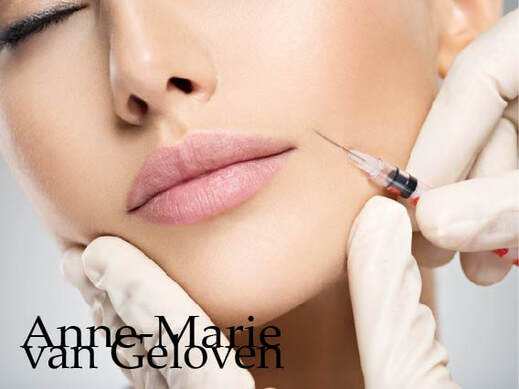
Skin ageing is a biological degenerative process, marked by loss. The number of patients seeking nonsurgical rejuvenation of the face and the body is continuing to increase due to a growing ageing population concerned with physical appearance. Women wish to maintain a youthful appearance and attractiveness represent 92% of all cosmetic procedures.(1) Men are keen to maintain physical characteristics associated with virility.(2) Millennials are also increasingly concerned with preserving their beauty and youth.(3) Among the various treatment approaches, different minimally invasive techniques have been developed and dermal fillers currently come second after botulinum toxin type A (BTA).(3) Their use is increasing worldwide.
"The fear of looking done is the number 1 reason why patients don't seek treatment"* The range of fillers available for soft-tissue augmentation is constantly expanding. The latest advances in filler technology include bio-stimulators that exert their aesthetic effect by promoting predominantly collagenesis or biological stimulation of new collagen and sometimes also elastin production. Therewith they provide a biological answer to the skin ageing degeneration process, with gradual and often very natural results. Over the course of last years the knowledge on injectable bio-stimulators has grown, and therewith their safety and popularity as they provide subtle longer lasting results. Facial fillers can be broken into 3 main groups:
Bio-stimulating fillers promote the body’s natural production of some ECM components (mostly collagen) over a period of several months. Their differences are characterized by their property of inducing natural collagen production. SYNTHETIC BIOSTIMULATORS
Calcium Hydroxylapatite Calcium hydroxylapatite: Calcium hydroxylapatite is a type of mineral that is commonly found in human teeth and bones and in injectbales the calcium hydroxylapatite particles are suspended in a gel-like solution. The effects of this material last approximately 18 months with minimal inflammatory response. Radiesse is a biodegradable filler consisting of 30% synthetic CaHA microspheres (diameter of 25-45μm) suspended in a 70% aqueous carboxymethylcellulose gel carrier. The soluble carrier gel evenly distributes the Radiesse CaHA microspheres providing 1:1 correction and gradually dissipates leaving the microspheres at the injection site where they induce collagenesis (collagen type I and mostly collagen type III) by fibroblast activation. Animal studies have shown that this new collagen growth occurs as early as four weeks post-injection and continues for at least 12 months with an average duration of effect of 12 to 18 months, though some results have been noted 24 months post-injection. Radiesse provides both immediate (replacement volume) and long-lasting (collagen biostimulation) volume enhancement. (5) Poly-L-lactic acid PLLA is a biodegradable, bioresorbable biocompatible man-made polymer. This material has wide uses in absorbable stitches and bone screws. The effects of PLLA generally become increasingly apparent over time (over a period of several weeks) and its effects may last up to 2 years. There is an inflammatory response. PLLA is an alpha hydroxy acid polymer of the lactic acid L-enantiomeric structure that has been safely used in many applications and in medicine for more than 30 years. Its use has expanded worldwide, associated with good long-term aesthetic results thanks to its biostimulatory-collagen effect. PLLA-based fillers are supplied as a lyophilized powder to be reconstituted with sterile water. The collagen stimulatory properties were evidenced in human in subjects (n=14) who received PLLA injections (3 sessions, spaced 4 weeks apart) at the postauricular level by collagen histochemical determination on biopsies taken at different times. Increase of collagen type-I was shown at 3 and 6 months. This study opened the new class of collagen stimulators. The long duration of action was demonstrated in a first pivotal study comparing PLLA versus collagen (116/117 subjects, respectively); the long-term safety/efficacy was shown up to 25 months. The rationale for several sessions was first documented in a dedicated article; this modality allows the effect through collagen stimulation, a biological process to occur and avoids overcorrection. PLLA fillers are among the most clinically documented products. (6) Polymers, polycaprolactone The PCL-based collagen stimulator is composed of PCL microspheres suspended in a carboxymethyl-cellulose gel carrier providing immediate and sustained volumizing effects when injected; the morphology, the biocompatibility of the PCL microspheres embedded with the collagen fibers produced all contribute to the creation of a unique 3D scaffold for a sustained effect. Its safety has been investigated in clinical studies and vigilance surveys. It presents the advantage of a slower degradation than polylactic acid (PLLA) or polyglycolic acid (PGA), which both belong to the same chemical family. Both the S and M products induced collagen production. In animal, the M product induced collagen type-III and type-I at early stage (measure at 9 months), and later predominantly collagen type-I, that deposits around the PCL microspheres (measure at 21 months). Many fibroblasts were found near the PCL microspheres. Interestingly, new elastin fibers were also formed, and neovascularization with new capillaries observed as well. (7) NATURAL BIOSTIMULATORS 1. Platelet rich plasma 2. Platelet rich fibrin 3. Polynucleotides like Nucleofill or Nucleadyn 4. Exosomes 5. Alginate 6. Tropoelastin (precursor of elastin molecule) 7. Poly-y-glutamic acid Platelet-Rich Plasma (PRP): PRP treatments are produced by spinning a small volume of the patient’s own blood through a centrifuge. This separates and concentrates the blood’s components, including platelet-rich plasma and the “buffy coat,” a solution that contains immune cells. The provider combines these two components with a small amount of calcium chloride (which activates and keeps the PRP stable), then injects them into the treatment area. Over a period of months, PRP stimulates the body’s natural collagen production. Platelet-Rich Fibrin (PRF): PRF is produced using a process similar to PRP concentration. The active material is a fibrin matrix rich in platelets, stem cells, and immune cells. Like PRP, PRF treatment stimulates collagen production and is also implicated in tissue regeneration, though there’s less data on the durability of its effects. Because both treatments use material from the patient’s own body, so there’s no risk of rejection or similar complications. PRF and PRP effects are durable — typically lasting longer than 18 months. Polynucleotides: Polynucleotides are most often natural, highly purified DNA molecules extracted for example from trout gonads and activate specialised cells called myofibroblasts and adipocytes. PN containing devices act as short time temporary fillers thanks to the viscoelasticity of the long DNA fragments and improve skin well‐being (cell growth) and steady self‐repair (tissue regeneration). Read more Exosomes: The use of exosomes at the Aesthetic & Anti-Aging Medicine World Congress in Monaco was discussed during many session and some excellent results were presented. However their use is not yet approved and safety and long-term effect not yet established and largely depends on the source. Read more BOTULINUM TOXIN There is evidence that the neuromodulator or musclerelaxer Botinumtoxin after injection upregulated the expression of type I collagen, decreases the production of some MMPs in fibroblasts, preventing collagen degradation and improves collagen organisation. (8.9.) ENERGY BASED DEVICES Intense Pulsed Light/BroadBand Light, Radiofrequency Microneedling, lasers, High-Frequency Ultrasound, Electromagnetic Tec. stimulate collagen production via a controlled damage and repair mechanism. DERMO-COSMETICS WITH BIO-ACTIVES There are innovative dermo-cosmetic products containing bio-stimulating ingredients, working more superficial in comparison to in-office treatments and they therefor are potentially an excellent choice as adjunctive care for biological rejuvenation and revitalization for younger looking and acting skin. They are safe to use easy to apply over face, neck and décolletage. Unlike in-office treatments their effects are temporary (fully reversible as regulated), hence they require daily or twice daily application. Bio-stimulating active ingredients in skincare which have shown to particularly stimulate the fibroblast are for example:
VITAMIN C IS NEEDED FOR COLLAGEN SYNTHESES! Our skin needs Vitamin C to produce collagen and is not able to produce it, thus relies on external resources for supply. Therefore I highly recommend to either get enough Vitamin C from your diet or use a high quality topical product pre & post biostimulators. Read more As the biological degeneration takes place in different layers of the skin and it's underlying structures, combining in-office treatments specifically targeting those layers in a series of treatments may provide longer lasting results and give higher patient satisfaction.(13) Safety and outcome rely on the qualification and experience of your cosmetic doctor, dermatologist or plastic surgeon. Take care Special thanks MD FAAD Hassan Galadari Jair Mauricio Cerón Bohórquez M.D. References: 1. American Society Plastic Surgeons. 2020 national plastic surgery statistics; 2020. 2. Wat H, Wu DC, Goldman MP. Noninvasive body contouring: a male perspective. Dermatol Clin. 2018;36(1):49–55. 3. Wang JV, Akintilo L, Geronemus RG. Growth of cosmetic procedures in millennials: a 4.5-year clinical review. J Cosmet Dermatol. 2020;19(12):3210–3212. 4. Evaluation of the biostimulatory effects and the level of neocollagenesis of dermal fillers: a review. Haddad S, Galadari H, Patil A, Goldust M, Al Salam S, Guida S International Journal of Dermatology, 29 Apr 2022 5. J Clin Aesthet Dermatol. 2015 Jan; 8(1): 38–49. Calcium Hydroxylapatite Over a Decade of Clinical Experience Jani Van Loghem, MD, Yana Alexandrovna Yutskovskaya, MD,b and WM. Philip Werschler, MDc 6. Clin Cosmet Investig Dermatol. 2022; 15: 997–1019. Collagen Stimulators in Body Applications: A Review Focused on Poly-L-Lactic Acid (PLLA) Marie-Odile Christen Read more 7. Clin Cosmet Investig Dermatol. 2020; 13: 31–48. Polycaprolactone: How a Well-Known and Futuristic Polymer Has Become an Innovative Collagen-Stimulator in Esthetics Marie-Odile Christen and Franco Vercesi 8. Oh SH, Lee Y, Seo YJ, Lee JH, Yang JD, Chung HY, Cho BC. The potential effect of botulinum toxin type A on human dermal fibroblasts: an in vitro study. Dermatol Surg. 2012 Oct;38(10):1689-94. 9. El-Domyati M, Attia SK, El-Sawy AE, Moftah NH, Nasif GA, Medhat W, Marwan B. The use of Botulinum toxin-a injection for facial wrinkles: a histological and immunohistochemical evaluation. J Cosmet Dermatol. 2015 Jun;14(2):140-4 10 EADV 2022 Inhibition of extracellular matrix degrading enzymes and bio-stimulation of fibroblasts – A novel approach to mitigate the advanced degenerative process in skin aging Weise J, Vogelsang A, Sperling G, Welge V, Nölter A, Mielke H, Knott A, Harbig S, Stuhr A, Dunckel J, Warnke K, Geloven van A 11. EADV 2021 Multifaceted novel approach to increase skin’s own epidermal and dermal hyaluron content Bussmann T, Warnke K, Krüger A, Möller N, Harbig S, Stuhr A, Dunckel J, Geloven van A, Weise J | Beiersdorf AG, Hamburg, Germany 12. Photochemistry and Photobiology, 2005, 81: 581–587 Novel Aspects of Intrinsic and Extrinsic Aging of Human Skin: Beneficial Effects of Soy Extract Kirstin M. Su¨del et al 13. Combination Therapy in Midfacial Rejuvenation Humphrey et al. Dermatologic Surgery 42:p S83-S88, May 2016. *AMWC 2023 Tapan Patel 
We all know the fairy tail sleeping beauty, however there is actual scientific evidence supporting that good sleep does make you more attractive. Chronic poor sleep quality is associated with increased signs of intrinsic ageing, diminished skin barrier function, lower satisfaction with appearance (1). A variety of studies in the literature have shown that sleep plays a role in restoring immune system function and that changes in the immune response may affect collagen production. (2) Before going into the science supporting that sleep makes you more beautiful, some tips for better sleep and less wrinkles:
A study was conducted with 60 healthy caucasian women, who were categorised as poor quality sleepers [Pittsburg Sleep Quality Index (PSQI) > 5, sleep duration ≤ 5 h] or good quality sleepers (PSQI ≤ 5, sleep duration 7-9 h. Good sleepers had significantly lower intrinsic skin ageing scores by SCINEXA(TM) . At baseline, poor sleepers had significantly higher levels of TEWL (trans-epidermal water loss). At 72 h after tape stripping, good sleepers had 30% greater barrier recovery compared with poor sleepers. At 24 h after exposure to ultraviolet light, good sleepers had significantly better recovery from erythema (redness). Good sleepers also reported a significantly better perception of their appearance and physical attractiveness compared with poor sleepers. (1) Sleep loss could also impact sexual behaviour and collaboration, because sleep is connected with attractiveness, which has an important impact in many social contexts (2). The notion of beauty sleep is actually very important, because sleep deprived people are perceived as more fatigued, less attractive, and even less healthy than when they are rested (3). Sleep deprivation is associated with increased signs of intrinsic skin ageing (fine lines, uneven pigmentation, reduced elasticity) (4), with much slower recovery rates after skin barrier disruption and lower satisfaction with appearance. If we compare people with a normal night sleep with the same persons but sleep deprived, the sleep deprived ones look more fatigued, with hanging eyelids, redder eyes, more swollen eyes, darker circles under the eyes, paler skin, more wrinkles and fine lines around the eyes, the corners of the mouth as being more droopy and more sad (5). In conclusion, the sleep is not connected only with good health (6,7), but is also a link between attractiveness and health. (2,8) Take care and sleep well
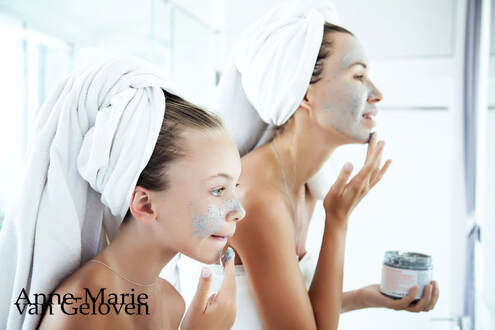
It was always believed that the moment we are born, is the moment we are exposed to environmental influences. The truth is that there is ample evidence that already during pregnancy the mothers behaviour: smoking or food has a significant impact on how well we age. We know that all skin needs to be protected against UV and HEVIS by using sunscreen, especially in sun exposed areas from birth onwards.
Although you can not start too early taking care of your skin, the right age to start with a well-ageing skin care routine is actually just post-adolescence for 3 reasons. 1. During adolescence most start with their first cleansing and care routines to remove access of sebum, debris and reduce plus prevent break-outs or comedones. Boys may already shave facial hair. So teenagers or young adults are used to a morning- and evening skin care routine which benefits the overall sense of well-being. 2. Most commonly growth stops when puberty ends and this is the moment the degenerative biological process starts, even though there are no visible signs yet. 3. Prevention of pre-mature ageing skin is the most effective and efficient strategy. SKIN NEEDS CARE There is a movement stating that normal unproblematic skin doesn't need care. I strongly disagree. The choice of products at this age depends of course on the skin type, skin condition, skin health, and environment (like weather conditions, pollution), however the morning care should always focus on protecting every skin type, using suncreen (UV + HEVIS protection) and ideally complimented by anti-oxidants to reduce damaging free radical activity, while the evening routine should at least include proper cleansing (to remove dirt and pollutants), which may be followed by product catering to specific needs, like for example sebum regulating, barrier repairing or hydrating ingredients. I would not make a differentiation between darker or lighter skin in terms of photoprotection, as dark skin only has a natural SPF of 13.3 and light skin of 3.4, hence both not enough to prevent sun damage. However, dark skin has a lower amount of ceramides in the statum corneum and is therefore more prone to trans-epidermal water loss. LAZY SKIN? If you are afraid of spoiling your skin and making it "lazy" using skin care for a long time, know that all effects from a dermo-cosmetic product are 100% reversible, thus temporary. This is regulated by law and to enjoy the benefits from skin care, you need to keep using the products. When you stop, your skin will bounce back to it's original state at least after a full regeneration cycle of about 28 days. A few things to avoid are: sun-damage, especially burns, over-exfoliation (damaged skin barrier) and slugging of oily or acne-prone skin (breakouts). Take care. 
Polynucleotides (PNs) are a type of biomolecule that have recently gained traction in the field of skin care and aesthetic treatments. PNs are composed of multiple nucleotides, which are the building blocks of DNA and RNA. These biomolecules have shown promise in improving the appearance and health of the skin through their ability to stimulate cell growth (activate growth factors), tissue regeneration incl. collagen production, wound healing, fibroblast proliferation and have anti-inflammatory properties.
Polynucleotides (PN) are linear polymers composed of many nucleotide units and they play a key role in the storage and transmission of genetic information. There are two types of polynucleotides (aka nucleic acid) found in nature: ribonucleic acid (RNA) and deoxyribonucleic acid (DNA). As mentioned, PN are composed of nucleotides, which consist of 3 parts: a nitrogenous base, a phosphate group. and a five-carbon sugar (2'-deoxyribose in DNA or ribose in RNA). The five base nucleotides are adenine, guanine, cytosine, thymine, and uracil. A DNA molecule consists of two long polynucleotide chains composed of four types of nucleotide subunits: adenine, thymine, guanine, and cytosine, while RNA uses adenine, guanine, cytosine and uracil. REGENERATIVE AESTHETICS Regenerative aesthetics is an emerging branch of regenerative medicine with therapies or products aimed at recapturing youthful structure and function using the body's own systems. Examples of such treatments are platelet-rich plasma (PRP), the use of exosomes or polynucleotides. Dr. Kate Goldie explained soft tissue regeneration fundamentals as following: 1. Regeneration of tissue architecture (structure): tissue composition - component abundance, ratio's, position, density and biomechanics/integrity 2. Regeneration of tissue function: signaling, cell function, cellular components (incl. senescence), gene expression and molecular interaction. The 3 treatment pillars of regenerative aesthetics are: cells, biocues and bio-stimulatory scaffolds. Key superficial soft quiescent cells are the fibroblasts and adipose derived stem cells. One of the big advantages of regenerative aesthetics is by using the body's own system, the results are natural and focused on "skin health" (function) and "skin quality" (appearance). POLYNUCLEOTIDES IN REGENERATIVE AESTHETICS Polynucleotides are most often natural, highly purified DNA molecules extracted for example from trout gonads and activate specialised cells called myofibroblasts and adipocytes. PN containing devices act as short time temporary fillers thanks to the viscoelasticity of the long DNA fragments and improve skin well‐being (cell growth) and steady self‐repair (tissue regeneration). Studies support their dermal reactivating properties or their efficacy as “bioreactivating primers” of skin. The final outcome is more natural and in‐depth tissue regeneration and a healthier look of the skin: a more radiant complexion, even skin tone, reduced appearance of fine lines, wrinkles and sagging, faster wound healing, improved pore size and skin thickness, elasticity and hydration. Furthermore, PNs are generally well-tolerated by the skin and have a low risk of adverse effects. Their effectiveness may vary depending on the individual's skin type, age, and overall health. The long-term effects of PNs on the skin are not yet fully understood, and more research is needed to determine their safety and efficacy. There are various brands available which use polynucleotides in their (meso-) injection gels. For example Mastelli Srl, Italy NEWEST® (Polynucleotide and Hyaluronic Acid) for bio-revitalization, BR Pharm HP Cell Vitaran Skin Healers, NUCLEADYN® or Nucleofill®. One brand of (synthetic) polynucleotide-based skin care products is Yuva by Dr. Devgan Scientific Beauty. The Yuva line includes a range of products formulated with PNs, such as the Yuva Serum and the Yuva Enhancer. These products are marketed as being able to provide hydrating, anti-aging, and skin-rejuvenating benefits. THE FUTURE OF POLYNUCLEOTIDES While polynucleotides have many benefits, they also have some drawbacks. One of the primary limitations is their instability in certain environments. This instability can make it difficult to synthesize and manipulate polynucleotides in the lab. Moreover their are limitations, risks and ethical concerns harvesting or using (human identical) PN's, and long-term safety and efficacy data is not conclusive. However, PNs are a promising area of research in the field of skin care and aesthetic treatments and regeneration. We can expect to see further advancements in the development of PNs-based products and treatments. PNs are already used in combination with other biomolecules, such as hyaluronic acid, growth factors and anti-oxidants and used in combination with other treatments. For a personal recommendation on which aesthetic treatment is most suitable to aesthetically regenerate your skin, please consult an experienced board certified dermatologist, plastic surgeon or cosmetic doctor. Take care. 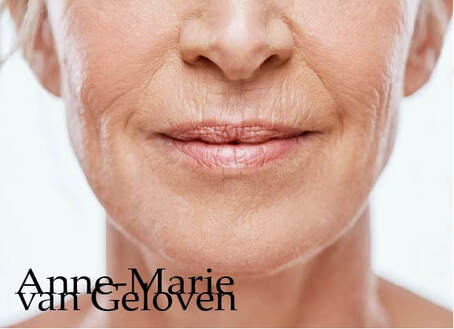
Glycation is one of the basic root causes of endogeneous (intrinsic) skin ageing and a very challenging one or almost impossible one to reverse. Glycation is an ageing reaction which begins in early life, developing clinical symptoms at around 30, and progressively accumulates in tissues and skin due to the glycated collagens that are difficult to be decomposed. Glycation occurs naturally in the body when sugars react with proteins and lipids to form advanced glycation end products (AGEs). AGEs can be exogenously ingested (through food consumption), inhaled via tobacco or endogenously produced and formed both intracellularly and extracellularly. AGE modifications lead to dermal stiffening, diminished contractile capacity of dermal fibroblasts, lack of elasticity in the connective tissues, contribute to hyperpigmentation and a yellowish skin appearance. The formation of AGEs is amplified through exogenous factors, e.g., ultraviolet radiation.
AGEs cause changes in the skin through 3 processes:
One study published in the Journal of Investigative Dermatology found that levels of AGEs were higher in the skin of older individuals compared to younger ones. The study also showed that there was a correlation between the level of AGEs and the severity of skin ageing. This suggests that inhibiting the production or accumulation of AGEs in the skin is a potential target for anti-ageing interventions or skin ageing management. AGEs are complex and heterogeneous, more than a dozen AGEs have been detected (however not all) in tissues and can be divided into three categories according to their biochemical properties. AGEs are formed through four pathways:
GLYCATION INHIBITION IS KEY AGEs can be crosslinked through side chains to form a substance of very high molecular weight, which is not easily degraded. The consequences from skin glycation are irreversible. This makes prevention or inhibition of the process the best potential strategy to maintain skin health and ageing skin management. One way to do this is by altering the diet to reduce the intake of sugars and carbohydrates, which are known to contribute to glycation. Several studies have found that reducing sugar intake can result in significant improvements in skin health, including reducing wrinkles and improving skin texture. 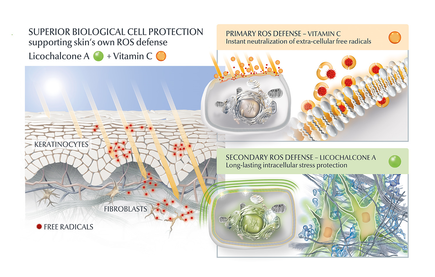
AGE inhibitors
Another potential strategy is the use of topical agents that inhibit the formation or accumulation of AGEs in the skin. One study published in the Journal of Cosmetic Science found that a cream containing carnosine, a peptide that inhibits glycation, improved skin elasticity and reduced the appearance of wrinkles in individuals with ageing skin. Skincare containing NAHP or Acetyl Hydroxyproline inhibits the formation of AGEs significantly (in vitro), most likely through a mechanism where NAHP competes with the proteins for the sugar. Finally, NAHP sacrifices itself in place of the proteins and gets (at least partially) glycated. NAHP also prevents loss of cellular contractile forces in a glycated in vitro dermis model and counteracts the diminished cell-matrix interaction that is caused by glyoxal-induced AGE formation. Anti-Oxidants Moreover, I would suggest to combine those ingredients with an ingredient like Licochalcone A. Numerous high ranked publications support that Licochalcone A protects cells from oxidative stress mediated by e.g. UV and HEVIS (blue light) induced reactive oxidative species (ROS). Due to the activation and nuclear translocation of the transcription factor NrF2, the expression of anti-inflammatory, antioxidant and detoxifying enzymes are induced. These enzymes protect the skin cells (like keratinocytes and fibroblasts) from ROS-induced damage, like lipid peroxidation and DNA as well as protein damage. If Licochalcone A is combined with L-Ascorbic Acid, (the most active form of Vitamin C), it supporting skin's own collagen production, provides superior biological cell protection amongst other relevant benefits. My absolute favourite product is Eucerin Hyaluron-Filler Vitamin C Booster which I use daily as a serum in my morning routine. GLYCATION AND SKIN HEALTH Acne In addition to its role in ageing, glycation in the skin has also been linked to a range of skin health problems. One study published in the Journal of Cosmetic Dermatology found that the level of AGEs in the skin was significantly higher in individuals with acne than in those without acne. The study also showed that treating acne with a topical antibiotic significantly reduced the levels of AGEs in the skin. Atopic Dermatitis Another study published in the Journal of Investigative Dermatology found that individuals with atopic dermatitis had higher levels of AGEs in their skin than healthy individuals. This suggests that glycation may play a role in the development of inflammatory skin conditions. Diabetes + Woundhealing The correlation between high sugar levels and skin ageing can be seen in diabetic patients, where one-third of this population has skin complications. A prominent feature of ageing human skin is the fragmentation of collagen fibers, which severely damages the structural integrity and mechanical properties of the skin. Elevated levels of MMP-1 and MMP-2 and higher crosslinked collagen in the dermis of diabetic skin lead to the accumulation of fragmented and crosslinked collagen, thereby impairing the structural integrity and mechanical properties of dermal collagen in diabetes. Collagen crosslinking makes it impossible for them to easily repair, resulting in reduced skin elasticity and wrinkles. Keratinocytes and fibroblasts are the main cells involved in wound healing, but due to the high glucose (HG) microenvironment in diabetics, the functional state of these cells is impaired, thereby accelerating cellular senescence (programmed cell death). Conclusion We can't completely stop the glycation process, therefore it's important that we inhibit it from a young age onwards, hence monitor the sugar intake of our children, use daily SPF and invest in good dermo-cosmetic products containing ingredients like NAHP and powerful anti-oxidants like L-Ascorbid Acid (Vitamin C is needed for the production of collagen) and Licochalcone A (also anti-inflammatory). Preventing signs of ageing, specifically caused by glycation is most effective. If your skin shows (advanced) signs of ageing, you can get visible improvement using skin component (hyaluron, collagen and elastin) bio-stimulating ingredients like Retinol, Bakuchiol, Arctiin, Creatine or Glycine Saponin. Consult your dermatologist if you wish to improve your skin's appearance or skin health issues. Take care Special thanks: Ph.D. dr Julia M. Weise Manager Biological Testing & Dorothea Schweiger Lab Manager Facial Skin Biology Beiersdorf HQ Hamburg 3/21/2023 Comments Exosomes in skin care and treatments
Skin boosters using micro-injections with predominantly non-crosslinked hyaluron filler gels like Restylane® Vital, Juvéderm® VOLITE or Belotero® Revive are gaining popularity for very good reasons. Unlike traditional dermal fillers, they are not injected beneath the skin to volumise or shape the face. Instead, they are very fine dermal easily integrated "fillers" that are injected into the skin to hydrate, improve skin quality and give very natural results. They are also gently bio-stimulating, meaning they "stretch" the fibroblasts in the injected area and as a result this cell is producing more collagen. An effective bio-remodeling skin booster using 2 times 5 injection points (bio-aesthetic points - BAP) for a full-face treatment is Profhilo®. However, the recent K-beauty treatment via topical application or micro-injections with bio-remodeling exosomes is gaining popularity.
Exosomes are nano-sized cargos with a lipid bilayer structure carrying diverse biomolecules including lipids, proteins, and nucleic acids. These small extra cellular vesicles are secreted by most types of cells (skin relevant are the keratinocytes and fibroblasts) to communicate with each other. Exosomes circulate through bodily fluids and can transfer information. They can be either good or bad, however taken from a healthy young cell they will be sending the best messages. Studies have shown the efficacy of exosomes in skin ageing. They can facilitate skin remodeling (increasing collagen and decreasing senescent cells) leading to skin rejuvenation. Cells sleep because they don't get enough bio-stimulation: messages. Better messages is better skin architecture. This is why exosomes are so important. At the World Stem Cell Summit it used to be 90% about stem cells (they only life 28 days) and 10% about exosomes, now it is 50/50. The reason is called heterochronic parabiosis. 1. One of the most robust methods of improving the function of ageing tissues is that of heterochronic parabiosis,. The effect was shown in a study with a surgical procedure whereby a young and old mouse are joined together so the share one circulatory system. 2 This study according to dr Kate Goldie AMWC 2023 Monaco is proof that it is not the cells, but the messages they give that is transforming lots of different tissues, which has the ability to profoundly regenerate tissues. That is why people are so interested in exosomes. Exosomes taken from a very young cell give potentially the best messages as they "send the message" of youth. EV (Extra-cellular Vesicle) is the actual correct term as messages come as micro-vesicles and exosomes and form 2 different messages from the cell. 3 We start to understand active ingredients. In exosomes one of the most important ingredients is RNA and is part of the future of regenerative aesthetics. Messenger RNAs up-regulate and Micro-RNAs down-regulate. They physically go into the cell and change how the cells works. So we have to be cautious. In this study "The therapeutic and commercial landscape of stem cell vesicles in regenerative dermatology" dr Kate Goldie et al. assessed all available exosomes in the (UK) market. Most exosomes used in-office are extracted from human stem cells and frozen to keep them as stable. Unlike actual stem cells, exosomes don't have a nucleus and therefore they are safe to use. Exosome therapy is the application of topical exosomes after in-office treatments which disrupt the skin barrier, like laser resurfacing, chemical peelings or microneedling. Exosomes are also used in micro-injections as a stand-alone skin boosting treatment and in a few skin care products. Be aware that as usual, not all products are alike. The way exosomes are sourced (origin), size, their content (can be growth factors) and function determine largely their efficacy and the price of the product. One of the challenges is that we do not really know what is in the exosomes. They are like small packages with a lot of messengers. The use of exosomes looks promising for several indications: regenerative aesthetic medicine, healing, scar treatment, burns and atopic dermatitis, however their safety is not yet fully established and no official registration for their use granted. Take care 1. Cell Cycle. 2012 Jun 15; 11(12): 2260–2267. Heterochronic parabiosis for the study of the effects of aging on stem cells and their niches Irina M. Conboy 2. Heterochronic parabiosis reprograms the mouse brain transcriptome by shifting aging signatures in multiple cell types Methodios Ximerakis 3. J Cell Biol. 2013 Feb 18; 200(4): 373–383. Extracellular vesicles: Exosomes, microvesicles, and friends Graça Raposo et al 3/19/2023 Comments Skin Flooding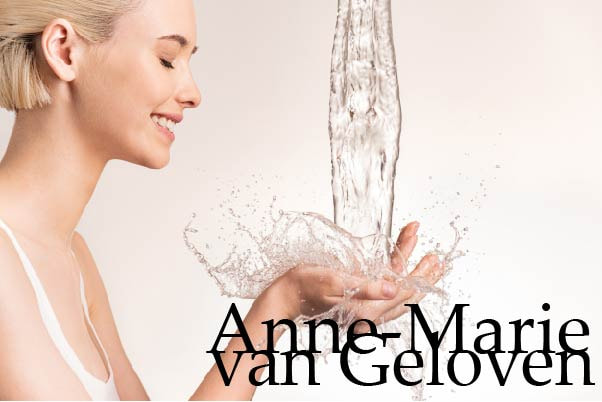
Skin flooding is the latest TikTok trend to counteract dry or dehydrated skin. It is basically layering hydrating mists, serums or creams to boost hydration in the skin. The idea is to start with a humectant-rich, lightweight products first and then add a thicker emollient to seal in the moisture on the skin. This is a trend which is suitable for all genders at all ages if products are chosen wisely.
DRY OR DEHYDRATED SKIN There is a difference between dry and dehydrated skin. Dehydrated skin is water-lacking skin, considered a skin condition and can be temporary, while dry skin is lipid-lacking skin and seen as a skin-type. All skin types (yes including oily skin) can be dehydrated. Picture yourself in an environment like airplane without any humidity. Our skin will react to this "dehydration condition" by either (over)production of oils and lipids to "protect" itself fro drying out or get very dehydrated. When the skin is producing a fierce amount of oils and lipids as compensation, you do not have lipid-lacking or dry skin, however your skin might be dehydrated. Lipid-lacking or dry skin has less ability to produce those oils or lipids and often has an impaired skin barrier. Lipids are the "mortar" between the bricks and when they are lacking, more water will evaporate from the skin and thus it loses hydration. FLOODING Therefore "flooding" without "suffocating" the skin, can be a good approach for dehydrated skin and all skin types at all ages. If you want to start your flooding regimen on damp skin, you start immediately after cleansing and toning or use a light mist containing hyaluronic acid and glycerin. Both ingredients are powerful humectants and attract and bind water to the skin surface. Afterwards you might want to first apply a hyaluronic acid containing serum and then a cream to "seal the deal". The difference between flooding and slugging is that flooding is focusing on maximising skin hydration or moisture, while slugging is focusing on prevention of trans-epidermal water loss by (semi)occlusion. Read more about slugging. HYALURONIC ACID Be aware not all hyaluronans are the same. There are different sizes. A macro-hyaluron (about 2000 kDa or larger) will lay on the surface of the skin and bind water there where the skin is losing the most water. A biologicaly active size hyaluron is the 52 kDa micro-hyaluron. This particular size molecule has proven to penetrate into the metabolic active layer of the epidermis, where is actually stimulates the keratinocytes (a certain skin cell) to produce +209% more hyaluron. This can be enough when you are young as the decline of hyaluron in the skin starts first in the epidermis. Be aware it is NOT recommended to use a hyalruon size below 30 kDa in skin care. Hyaluronic acid has the ability to bind and attract water up to 10.000 times is molecular weight, are great to plump up the skin, however the smaller sizes have a different function and can actually harm the skin by for example causing inflammation. LINES AND WRINKLES If you get a bit older, also the dermis will lose it's most important filling substance (hyaluron). There is another skin cell type which can be stimulated to produce more called the fibroblast. This cell is a key cell in the junction of the epidermis and dermis and the dermis, so deeper layer. The powerful anti-oxidant and bio-active Glycine Saponin or abbreviated Saponin can bio-stimulate this cell to produce +256% more skin's own hyaluron, +49% more collagen and +19% more elastin. Moreover, there are products on the market which contain all of the above PLUS Enoxolone. Enoxolone has the ability to inhibit the activity of an enzyme called HYAL1 >50%. HYAL1 is one of 6 different hyaluronidase enzymes which degrate skin's own hyaluron, hence eliminate it from our skin. These enzymes get more active in sun-exposed or mature skin and are partially responsible why our skin will lose hyaluron as we age. Together with the anti-oxidant Saponin, Enoxolone can slow down the elimination of skin's own hyaluron via 2 complimentary pathways: physical and enzymatic degradation. With other words, products containing 2 different sizes of hyaluron, Glycine Saponin and Enoxolone will fill, stimulate and defend skin's own hyaluron in both the epidermis (top layer) and the dermis (middle layer) of the skin. Great for dehydrated and early or visible signs of ageing, like fine lines and (even deepest) wrinkles. DAY AND NIGHT For daytime I would highly recommend a cream with protective SPF and for nighttime a product containing regenerative and barrier repairing Dexpanthenol or Pro-Vitamin B5. Anti-oxidants are good in every day and night time routine. If you want to use a refreshing hydrating mist, there is only one product with hyaluronic acid I recommend and it is Eucerin Hyaluron-Filler Mist Spray. The reason for this is that it has a skin friendly pH unlike (thermal) water. Water has a pH of 7-8 which is like a slight "insult" to the skin's healthy pH every time you spray. With the Hyaluron-Filler Mist Spray, you rebalance the skin's healthy pH level and use it as much as you like. pH to me is the foundation of good skin health. I have written a few pH related blog-posts and if you are interested simply click on the "read more" button below. Take care 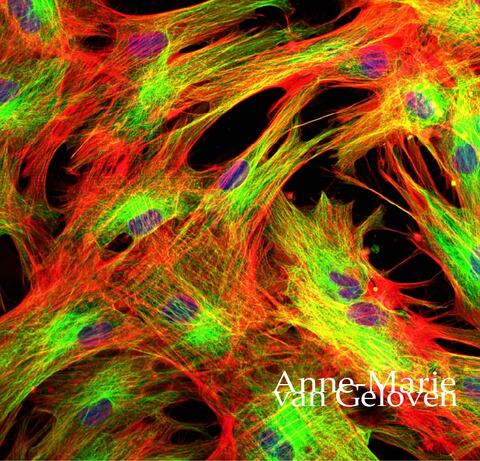
The fibroblast is one of the most important cells involved in ageing skin. You can find it in the lower layer of the epidermis and the dermis. It has many functions, one of which is the production of key components like hyaluron (filling + hydration), collagen (strength + structure) and elastin (flexibility + stretch). It particularly has to work hard to replenish hyaluronic acid or hyaluron as this filling component only has a half-life in the skin of several hours up to a day. Good quality collagen can last 15 years and elastin up to 70 years. It is also believed to be involved in the clean-up of dysfunctional components, like for example broken elastin, which is visible photodamage-damage and called solar elastosis. Fibroblast senescence (agedness) does also increase the risk of age spots. In proper ageing skin management, the fibroblast is a key target-cell.
Many aesthetic in-office treatments like ultrasound, radio-frequency, chemical peelings, laser etc. are based on causing controlled damage to the skin provoking wound-healing. This is the base of their rejuvenating or aesthetic impact. The number of new fibroblasts (myofibroblasts) is increased during the wound-healing process. Some injectables, like for example hyaluron-fillers cause the fibroblasts at the injection site to stretch and bio-stimulate collagen production. There are specific bio-stimulating injectable treatments. The most popular ones are Sculptra®, Radiesse®, Ellanse®, and a new one which combines hyaluron-filling and bio-stimulation is HArmonyCa®. As we age the fibroblast is undergoing some changes because of intrinsic and extrinsic factors. It loses it’s production power, it flattens, loses mechanical tension and therewith the ability to interact with other cells in the skin. It is becoming “tired and deaf”. My hypothesis was that injecting large droplets of hyaluron into the dermis might cause the fibroblast to become “lazy” via a negative feedback mechanism: when something is present in abundance, the fibroblast might not be stimulated enough to work hard to replenish it. This is not yet scientifically proven. It is important to keep the fibroblast in good shape and biologically active. We can stimulate it’s biological activity with skincare containing bio-stimulators, or ingredients which activate the production of important skin components by the fibroblast. On the other side we need to protect the cell from damage. Bio-stimulating active ingredients in skincare which have shown to particularly stimulate the fibroblast* are for example:
Protection from photo-damage we can achieve with a combination of sunscreen and anti-oxidants, more specifically Licochalcone A. Licochalcone A has a proven broad ability to protect the skin from damaging free-radicals or oxidative stress from UVA, UVB and HEVIS (High Energy Visible Light) affecting keratinocytes and fibroblasts. I am not yet aware of skincare ingredients which increase the number of (new) fibroblasts, like the semi or minimal invasive in-office treatments. It’s an interesting field to explore if this is possible without injury, inflammation or irritation. However, you probably get "more bang for your buck" by starting a a skincare routine with focus on bio-stimulation and protection of the fibroblast pre- and post minimal and semi invasive aesthetic treatments. This could be something we will proof with a clinical study. Take care *in vitro 
We all learned that sleeping in make-up is the ultimate skincare sin. What is bad about it is when you go 24 hours without washing your face and end up going to bed leaving your day-time make-up on. Over the course of the day, our skin accumulates pollutants, dirt and dead skin-cells.
If dirt and pollutants are left on the skin, they may cause micro-inflammation and contribute to premature ageing skin via a process called inflamm-aging and free-radical damage which is a major contributor to skin-ageing. The combination of both micro-inflammation and free-radical damage is called ox-inflammation. We should aim to reduce or preferably avoid it. Pollution, dirt and sebum (oils) can impact the skin's healthy pH balance and thus lead to a weakening of the skin barrier function, more sensitive skin, dehydration, slowed down skin-cell renewal process and thus ageing. Not removing dead skin cells together with dirt increases the risk of clogged pores. Make-up itself usually doesn’t contain harming ingredients. Coloured micro-pigments actually provide additional sun-protection. Make-up or foundation itself is thus not the problem, however the fact that we don’t cleanse our skin after a busy day and/or evening is what could make us age faster. Not doing your PM cleanse and care routine is anyway a missed opportunity to support your skin’s night-time recovery with beneficial active ingredients. If you go out in the evening, take the opportunity to cleanse before getting ready and get rid of debris which was accumulated during day-time. Don’t worry about falling asleep in your make-up once or twice. Just don’t make it a habit. I would always aim to remove eye make-up. Sleeping in full eye make-up (mascara, liner, eyeshadow) increases the risk of an eye-inflammation, redness and corneal abrasions. Waking up with “panda-eyes” filled with black rheum or goop isn’t pretty either. Take care 2/18/2023 Comments Skincare peri and post menopause
Our life expectance is increasing and the average age when menopause occurs didn't change much in the last decade. This is why more women will have to care for post menopause skin for a longer time. During and after menopause our skin will go through some changes and might even become problematic. In this blog post I will have a closer look into these changes.
Change During the start of menopause, also called peri-menopause, women will notice some changes to their skin. This is because estrogen levels start to decline (-35% between age 35-50) and as estrogen level decline, androgen level proportionately become more dominant. As a result, the majority of women experience drier skin. Or when the hormone levels are differently balanced they may get a more oily skin or develop acne tarda (adult acne), because the oil gland activity is increased. Another problem is that the skin's pH level will increase, which will impact skin health, barrier and microflora or microbiome. A higher pH value may result in problematic skin. Loss of biological activity Around this period the metabolic biological activity in the skin will decrease faster than in our 20s or 30s. The production of important components like hyaluronic acid (filling + hydration), collagen (strength + structure) and elastin (flexibility + stretch) by fibroblasts (a very important skin cell) isn't sufficient, while the speed of their degradation is inclining because the skin's natural resilience against damaging free radical activity is reduced and the activity of degradation enzymes, like hyaluronidase, collagenase and elastase is elevated. Therewith the presence of those important skin components is declining 30% in the first years. This leads to more advanced signs of ageing skin and an overall loss of skin quality: skin firmness, skin surface eveness, skin tone eveness and glow (Goldie, Clin Cosmet Invest Dermatol, 2021). Solution Skin ageing is a multifaceted continuous biological degenerative process, with an impact on overall skin quality, self perceived attractiveness, confidence and comfort (Quality of Life). The optimal solution should improve all 4 emergent perceptual categories or EPG's of skin quality (an important component of human attractiveness) as mentioned above. This can be achieved by supporting skin's own resilience against the inclined loss by degradation (reduce free radical and enzymatic activity) and increase skin's own biological activity, hence skin's own production of hyaluron, collagen and elastin with bio-active ingredients or bio-stimulators and inhibit human tyrosinase activity (reduce age spots). I will explain the 4 key actions below: 1. Bio-stimulators Some evidence based bio-actives we can find in skincare are:
2. Enzyme inhibitors Some ingredients in skincare which inhibit enzymatic degradation are:
3. Anti-oxidants Damaging free radical activity is increased in mature skin and ROS (Radical Oxidative Species) increase degradation of all components, enzymatic degradation and human tyrosinase activity, a powerful cocktail of anti-oxidants is a "must-have". The combination of fresh activated L-Ascorbic-Acid (primary defence with instant neutralisation of extra-cellular free radicals) and Licochalcone A (secondary defence with long-lasting intracellular stress protection is a valuable addition in any day or nighttime skincare regimen. Licochalcone A is moreover one of the most powerful anti-oxidants (if not the most powerful one) proven to reduce (deep) oxidative stress from High Energy Visible Light or HEVIS. As we know, free radicals from HEVIS damage the important skin-cell called the fibroblast and increase the risk of age spots. A product which development was initiated, supported and clinically tested by me is Eucerin's Hyaluron-Filler Vitamin C Booster. I highly recommend this product, especially after a collagen-stimulating in-office procedure. 4. Human tyrosinase inhibition A relatively new, effective and safe ingredient in skincare which was tested on inhibiting human tyrosinase is Thiamidol. Other ingredients in skincare were tested on mushrooms (Hornyak, Journal of Investigative Dermatology 2018 & Mann et al. 2018) and are not potent in reducing human tyrosinase activity. It took 10 years of pioneering research (dr Ludger Kolbe) and comparing 50.000 actives to patent and market it. In the mean time Thiamidol is loved and recommended globally by many dermatologists and evidence based with 35+ studies including >2000 participants with all Fitzpatrick phototypes. Every AM routine should at least have a skincare product with SPF of 15 or higher. An improvement of skin quality leads to an improvement of quality of life (van Geloven et al. EADV 2022). Hope this was helpful. Take care 2/15/2023 Comments GENDERED AGEISM
According to a survey with responses from 729 participants aged 18- 70+, with 65% of respondents coming from the United States and the majority of the remainder coming from Canada, the UK and Europe ‘lookism’ often trumps the performance of women when they are evaluated and often are pushed to the sidelines and/or pushed out to make room for younger workers. Once terminated, women find it much more challenging to get rehired at a time when may they lack funds for retirement. The pressure is especially high on single women and mothers 50+, which is a fast growing demographic. In many countries the retirement age is 67 years. It's not acceptable to be seen as less valuable or even irrelevant the last 17 years of your career, while having a lot of value to offer to jobs, companies and co-workers.
Ageing is a beautiful journey of collecting knowledge and experience. It is a privilege, however gendered ageism a growing and relevant problem. Physical ageing is a biological degenerative process, which can't be completely stopped, but can be positively influenced. For example, I work daily with a team on the creation of evidence based skincare products to significantly improve visible signs of ageing and quality of life. This requires that >80% of users agree that the product makes them feel more attractive, confident and comfortable in their skin. Unfortunately more needs to be done and age discrimination laws are less effective for mature women (McLaughin LABOUR 2020). Therefore gendered ageism should be addressed in diversity & inclusivity initiatives. When I turned 50, I joined an initiative in the company I work for called "New Generation 50+". It's a work-in-progress, however a start to reduce and hopefully together stop (gendered) ageism in the workplace and society. We should not accept the devaluation of mature women (or men). Many feel almost "invisible". If they don't "see you", make people listen to you and speak up if you feel you are not treated fairly. Many companies focus on recruiting "young talents". I would like to challenging them to hire, engage and retain 45+ talents. Being talented doesn't have an expiration date. Take care 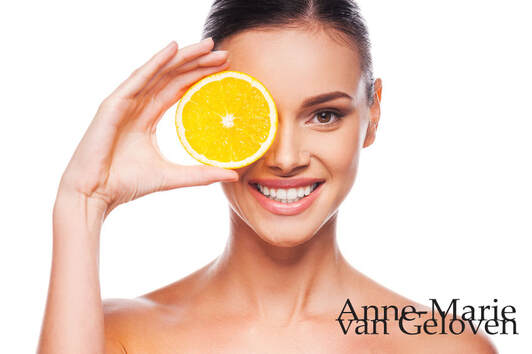
Vitamin C is a "must have" skin care ingredient our skin needs at any age.
One of the best researched skin care ingredients and proven to be very beneficial for skin is Vitamin C. Our skin uses Vitamin C as an anti-oxidant and the dermal fibroblasts need Vitamin C for the production of collagen. Two very good reasons to add this ingredients into your daily skincare routine whether you are twenty or eighty. Moreover, our skin depends on us for the needed supply, as our skin is not able to produce Vitamin C itself. We can either include enough Vitamin C in our diet or apply Vitamin C topically there where we need it the most. Usually this is the skin which is exposed to (sunlight) as this increases damaging free radical activity in our skin. An active form of vitamin C can reduce the free radical activity, which we call anti-oxidative effect. There are 4 things to consider when buying a skincare product containing Vitamin C:
Day or night? Some recommend to use Vitamin C during the night, as the active form of Vitamin C will oxidize in daylight. Hence, your skin can benefit from the Vitamin C longer during the night. I would recommend Vitamin C to be used during daytime (thus added to your morning routine), as we need protection from damaging free radicals the most during daytime and the oxidization of Vitamin C is actually a sign that the ingredient is doing it’s job! It’s even better to add Vitamin C both to your day & night time skincare routine. Is L-Ascorbid Acid enough? Vitamin C is counteracting free radicals from UV light. However, UV is not the only damaging light form as there is also High Energy Visible Light or abbreviated HEVIS. This penetrates even deeper into the skin where also the dermal fibroblasts reside. The dermal fibroblasts are our collagen and hyaluronic acid producing cells and a key target in an effective anti-ageing skincare strategy. Lichochalcone A (Licorice-root extract) has proven to be the most potent anti-oxidant to protect the dermal fibroblasts and neutralize free radicals from HEVIS. Moreover, Lichocalcone A increases Glutathione, which is a skin’s own anti-oxidant. Licorice-root extract is an anti-ageing hero. Summary The combination of Vitamin C and Lichocalcone A will protect our skin and dermal fibroblasts from free radical damage by UV and HEVIS and will provide superior biological cell protection in comparison to Vitamin C only. For me this is a good reason to use a product containing both ingredients as a first step after my cleansing routine in the morning. If you have sensitive eyes, I recommend to use an eye care prior, which will form a barrier to help to prevent the low pH Vitamin C product to migrate into the eye area. Afterwards you can use the other products of your skincare routine. I would like to put emphasis on using a SPF of 30 or higher during the day. This will not only help to protect your skin, but also support the anti-oxidative benefits and make them last longer. Hope this was helpful. Take care! 
Psoriasis occurs in many different forms and levels of severity. The first signs may appear between the age of 15 and 35 and 75% of patients are diagnosed before the age of 46 according to the World Health Organisation. As there is no cure for the disease, the highest prevalence is seen in a more mature age group age 50-69. Many of the treatments which are part of the standard treatment guidelines for psoriasis cause as a side effect premature ageing skin. For example PUVA, next to being an effective treatment, does cause (severe) photo-damage. Many patients will undergo such treatments on and off or continuously throughout their life.
Although the primary goal of dermatology is to improve the functional attributes of the skin (health) and lessen the tremendous burden psoriasis may cause, ultimately one aims to improve the skin's physical attributes (appearance). Ageing skin is a biological degenerative process which influences the activity of collagen and hyaluronic acid producing cells (mainly fibroblasts) and leads to a decrease of skin components like collagen, hyaluron and functional elastin. Effective anti-aging skincare can support the protection of those cells and skin components (anti-oxidants and SPF) and thus slow down the fastened degenerative process. Some active ingredients (for example biologically active Glycine Saponin and Arctiin) have proven to effectively stimulate fibroblasts in the production of collagen and hyaluronic acid and thus replenish dermal components. Loss of those components and photo-damage eventually lead to visible signs of ageing. Although ageing skin is natural, premature ageing skin isn't necessary. Most patients will probably already use a moisturising facial skincare product. It makes sense to recommend anti-ageing skincare instead to be used in conjunction with treatments which as a side effect cause premature ageing skin, particularly for exposed areas like the face. As psoriasis oftentimes doesn't occur in the face (except in the hairline), anti-ageing skincare will pose a low to no risk to aggravate facial skin and there are anti-ageing skincare products available which have proven to be suitable for psoriasis patients. Take care. 
One of the frequently asked questions is, if it's necessary or if there is a benefit using a special eye care or cleansing products. Yes, there is!
As I mention in many of my previous posts, the right pH-level is very important for healthy skin. Skin usually prefers a pH of around 5. However there are some area's where the skin's natural pH balance is a little bit different. One of those area's is the area around the eyes. The preferred pH-level there is around 7, thus less acidic and more alkalic in comparison to your regular cleansing or care product for face or body. This is one of the most important reasons why I would recommend to use a special eye make-up remover and eye care product, as they are adjusted to the pH level most suitable for use in the eye area. Furthermore, special eye products are tested and proven to be safe when used around the eyes, while it isn't always recommended or proven for a regular face product. Some care products have a tendency to "travel" or migrate into the eye area. Even when not directly applied around the eyes, they might end up there. A special eye care product can form a "barrier" and thus help to prevent that unwanted products move to the eye area and cause irritation. I would particularly recommend the use of an eye cream when using other products containing gold standard anti-ageing active ingredients like Vitamin A, C (or derivatives of both), Hydroxy Acids (Alpha, Beta or Poly), when you have experienced some sensitivity of the eyes or eye area in the past or have a more problematic skin type. Eye care products preferably should not contain Vitamin C (L-Asorbic Acid or related) as it requires a low pH value of <4 to be active and do it's job properly. Eye care products with Vitamin C therewith are either too acidic to be used in the eye area or alternatively too alkalic for the Vitamin C to be effective. Safe to use in the eye area are products containing Hyaluronic Acid. Although "Acid" is in the name, Hyaluronic Acid isn't acidic. One of it's key functions is attract and bind water, which usually has a pH of ~7. Take care! 7/22/2018 Comments Skin care with something blue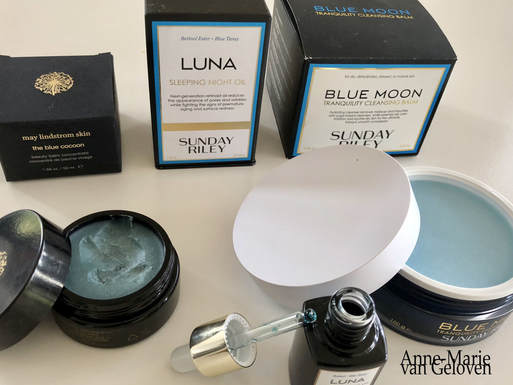
Lately I was trying out several skin care products with a very similar smell, which I actually started to appreciate during my evening skin care routine.
Usually, an overpowering fragrance in a product puts me off, however I consider this one soothing. The (in my opinion) pleasant odour comes from an ingredient called Tanacetum Annuum or Blue Tansy (Moroccan Blue Chamomile - not to be confused with Tanacetum Vulgare) and is found as the signature ingredient in some more luxury "Blue" products like May Lindrom's beauty balm concentrate called "The Blue Cocoon", Sunday Riley's tranquility cleansing balm called "Blue Moon" (Blue Tansy Leaf oil) and her sleeping night oil called "Luna". All products are relatively "oily" and you only need the littlest amount. Blue Tansy is "calming", as it supposed to have anti-inflammatory and anti-allergenic, anti-histaminic and anti-fungal properties. Tanacetum Annuum is an essential oil with a very dark blue collar due to chamazulene. The aromatic description is sweet, warm fruity, with subtle floral, camphorous and herbaceous undertones. It's most often mixed in with other oils or ingredients to dilute it, as the recommendation is not to use concentrations above 5%. Although it has anti-inflammatory properties, some might have intolerance for it as it contains camphor, which can cause sensitivity. Therefore, I would not recommend to use multiple products containing Blue Tansy in conjunction. Pure Blue Tansy oil is not easy to get hold of, thus an expensive ingredient. If I was asked choose one product, I would pick Sunday Riley Luna sleeping night oil which also contains Retinol. Luna is easy to use and incorporate in a night time regimen, is less expensive when compared to May Lindrom's "The Blue Cocoon", very popular amongst "beauty guru's" and receives many positive reviews. Alternatively, there are other evidence based skin care ingredients with proven anti-inflammatory properties, for example Arctiin (anti-inflammageing, stimulates hyaluronic acid and collagen production) and Licochalcone (also powerful anti-oxidant). They don't have the blue colour or "calming" odour, which some may find offensive. Hope you enjoy healthy skin & take care. 7/22/2018 Comments Chemical or mechanical exfoliation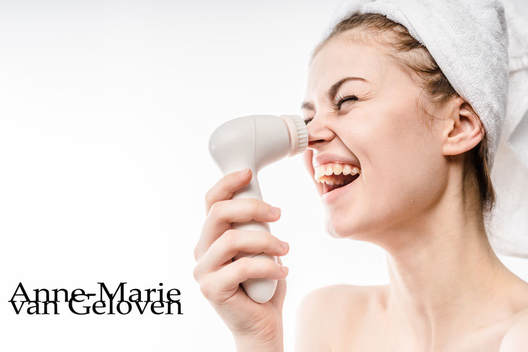
We can support's skin natural exfoliation process in various ways, for example with mechanical or chemical exfoliation.
Desquamation (shedding of skin cells thus exfoliation) is an important part of the skin's natural regeneration or renewal process. Already in our twenties, this process slightly, however increasingly starts to slow down (Kligman 1983). As a result, the cells on the surface of our skin (corneocytes) become bigger (Kligman 1989) and a little disorganised. This leads to a duller appearance (loss of radiance) and a more rough texture of our skin. A very comprehensive comparison of both methods:
The word "acid" unfortunately sounds very harsh and skin-unfriendly. Many acids are actually skin's own, like for example lactic acid is a skin's own natural moisturising factor (NMF) and so is hyaluronic acid. The level of NMF's decrease as we age and our skin my lose the ability to maintain well hydrated. Many years ago the benefits of lactic acid were capitalised by using baths filled with donkey milk. Citric acid is commonly used in skin care products and toners to balance skin's pH. Gluconolactone is only gradually penetrates skin and is very gentle.
It's unfortunate that "acids" have such a negative connotation, as our skin (healthy and problematic) can benefit if we use them regularly. Moreover, I prefer this method over mechanical exfoliation for all skin types, however particularly if you have dry skin, acne- or redness prone skin, sensitive skin or mature skin. The risk of exfoliation is over-exfoliation. Over-exfoliation is damage of our skin barrier and the symptoms are very comparable to dry or (hyper) sensitive skin symptoms, which are: redness, irritation, tightness, excessive dryness, dry patches, flaking skin, uncomfortable stinging, or even burning sensation. Whenever you experience one or more symptoms of over-exfoliation, it's recommended to reduce the number of times you exfoliate and support the skin barrier repair with a moisturiser. Hope you enjoy healthy skin & take care. 7/15/2018 Comments Facial oils bad for skin?!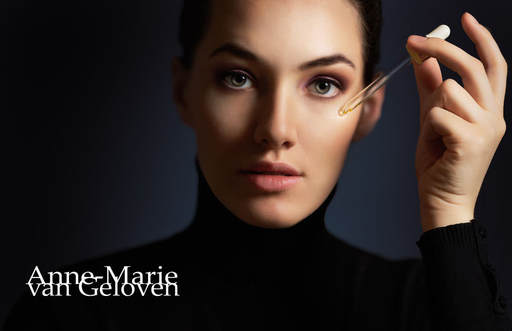
Facial oils are a trending skin care product at the moment, loved and recommended by many "beauty guru's" and skin care experts. This is why I found it very interesting to read a comment written by a well respected dermatologist claiming that face oils would stifle skin renewal and exfoliation and would make skin dull over time. She must have a reason why she is saying this, and that's why I looked into this a little bit deeper.
To start with, I've done own research (not just me) with a facial oil, included many testers and found many benefits and no draw backs during the duration of the study. Moreover, I jumped out of my chair (literally) when I saw the visible results from the clinical photography, no joke! We've found that the oil (a combination of Argan oil and Lady's Thistle oil) improves moisture, elasticity and firmness, supports skin resilience, making the skin feel smooth and look more radiant. There was even a reduction of comedones detected. The results were published in a poster, accepted by the European Academy of Dermatology and Venereology in 2016. If you are an impatient person, and demand a fast answer, I can spill the tea right now: I've found no data to support that facial oils would stifle skin renewal and exfoliation, but the opposite. Moisturisers absolutely influence the skin barrier function and TEWL (transepidermal water loss - which is used to measure the skin barrier function). A good barrier function (confirmed by low TEWL), positively contributes to the skin cell renewal process, which includes skin exfoliation process. Very dry skin has an increased TEWL, and so does very well hydrated skin. There is simply more water on the skin surface to evaporate. A high TEWL with very well hydrated skin can therefore give the impression of an impaired barrier function and thus give a "false positive". This phenomenon is nicely explained in a publication by Marie Loden "Effect of moisturizers on epidermal barrier function". Looking at non fragrance plant oils also called fixed oils, there are many and they are all different, so it's impossible to generalise. Many plant oils, like almond, jojoba, soybean and avocado oils mostly remain on the skin surface. Even without penetrating deeper into the outer layer of the skin (called epidermis), the occlusive effect of plant oils will reduce water evaporation from the skin and help the growth of the cells of the top layer called keratinocytes. They actually support the skin barrier and therewith skin cell renewal. Part of the skin cell renewal is a process called desquamation, which is skin's natural exfoliation of dead skin cells. Helping this process will make skin appear more radiant and smooth, not duller. The benefits of plant oils are supported in many publications, one of which is found in the International Journal of Molecular Sciences anti inflammatory skin barrier repair effects by Tzu-Kai Lin 2017. Argan oil One of the most popular and well researched fixed oils is organ oil. It contains oleic and linoleic fatty acids. Both are part of our skin's natural intercellular lipid-enriched matrix or skin barrier. Linoleic acid (an omega 6 fatty acid) is in fact the most abundant polyunsaturated fatty acid. Our skin barrier is protecting our skin from water loss and penetration of external agressors. Thus the skin barrier keeps the good stuff in and bad stuff out. Linoleic acid plays a direct role in maintaining the integrity of this skin barrier. Some research shows that oleic acid may indeed disrupt the skin barrier and act as an permeability enhancer, helping other ingredients to penetrate deeper. When oleic acid is continuously applied, it could lead to barrier problems. Another ingredient in argan oil is tocopherol or vitamin E. Tocopherol is well known for it's antioxidative effect (neutralising damaging free radicals from pollution or sun which cause premature ageing) and lesser known for supporting the skin barrier. Daily topical application of argan oil (the finished product which contains multiple ingredients) has shown to improve skin elasticity (firmness), improve the skin hydration by restoring the barrier function and maintaining water-holding capacity. Furthermore it has a softening and relaxing effect on skin. Lady's Thistle oil The oil of the Milk Thistle plant (also known as Silybum Marianium) is a common ingredient in anti-aging skincare. It contains skin barrier supporting Linoleic acid and is known to nourish skin and improve radiance. Facial oils are certainly not for everybody, but in general skin will benefit from a cold pressed fixed plant oil or a mixture. Don't smother skin with oils, just apply a few drops by itself on the skin prior or after your moisturiser, or mix a few drops with your moisturiser of foundation. Hope you enjoy radiant skin & take care. |
CategoriesAll Acne Ageing Aquatic Wrinkles Armpits Biostimulators Blue Light & HEVIS Cleansing CoQ10 Cosmetic Intolerance Syndrome Deodorant Dermaplaning Diabetes Dry Skin Evidence Based Skin Care Exfoliation Exosomes Eyes Face Or Feet? Facial Oils Fibroblast Fingertip Units Gendered Ageism Glycation Gua Sha Hair Removal Healthy Skin Heat Shock Proteins Hormesis Humidity Hyaluron Hyaluronidase Hypo-allergenic Indulging Jade Roller Licochalcone A Luxury Skin Care Lymphatic Vessel Ageing Malar Oedema Menopause Mitochondrial Dysfunction Mood Boosting Skin Care Neurocosmetics Ox Inflammageing PH Balance Skin Photo Biomodulation Polynucleotides Psoriasis Regenerative Treatments Review Safety Scarring Sensitive Skin Skin Care Regimen Skin Flooding Skin Hydration Skin Senescence Skip-Care Sleep Slugging Sunscreen Tanning Under Eye Bags Vitamin C Well Ageing Skin Care Wound Healing Wrinkles
Archives
April 2024
|




 RSS Feed
RSS Feed
